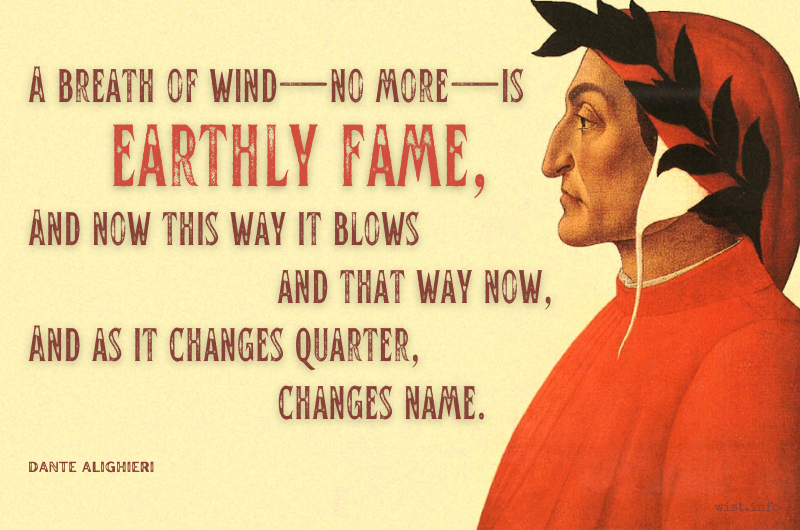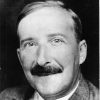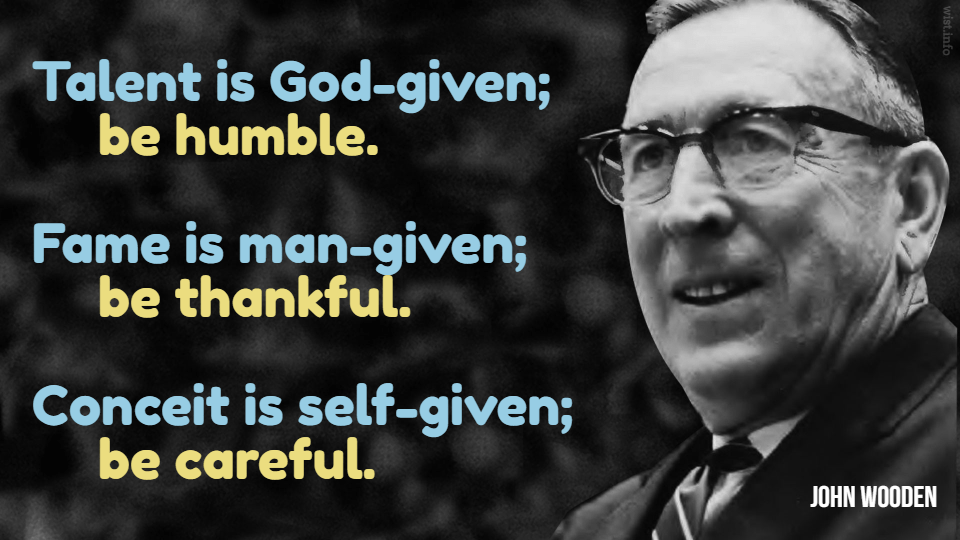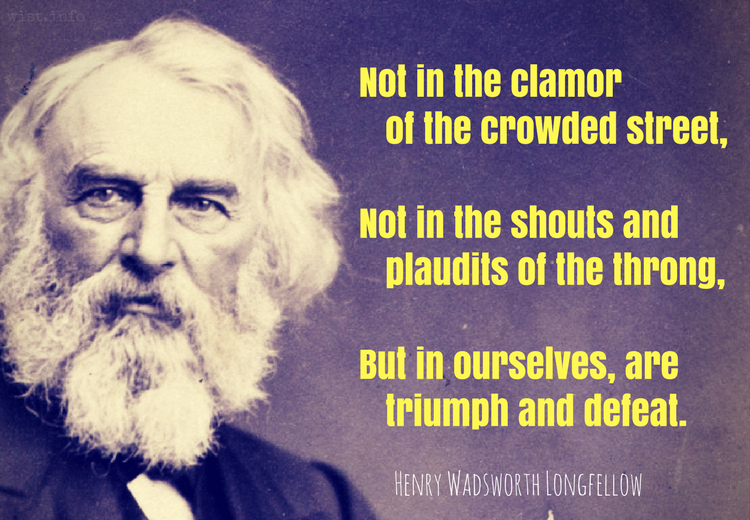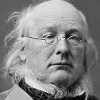We are all motivated by a keen desire for praise, and the better a man is, the more he is inspired by glory.
[Trahimur omnes studio laudis et optimus quisque maxime gloria ducitur.]
Marcus Tullius Cicero (106-43 BC) Roman orator, statesman, philosopher
Pro Archia Poeta [For Archia the Poet], ch. 11 / sec. 26 (62 BC) [tr. Guinach (1962)]
(Source)
(Source (Latin)). Other translations:We are all influenced by a desire of praise, and the best men are the most especially attracted by glory.
[tr. Yonge (1856)]We are all drawn away by an eagerness after praise, and even the very least of men is most led by fame.
[tr. M'Donogh Mahony (1886)]We are all drawn on by a desire of praise, and each best one is led chiefly by glory.
[tr. Dewey (1916)]Ambition is an universal factor in life, and the nobler a man is, the more susceptible is he to the sweets of fame.
[tr. Watts (Loeb) (1923)]We are all drawn on by the pursuit of praise, and all the best of us are so led by glory in the highest degree.
[tr. Allcroft/Plaistowe (c. 1925)]We are all motivated by the desire for praise, and the best people are the ones who are most attracted by glory.
[tr. Berry (2000)]
Quotations about:
fame
Note not all quotations have been tagged, so Search may find additional quotes on this topic.
OBLIVION, n. The state or condition in which the wicked cease from struggling and the dreary are at rest. Fame’s eternal dumping ground. Cold storage for high hopes. A place where ambitious authors meet their works without pride and their betters without envy. A dormitory without an alarm clock.
Ambrose Bierce (1842-1914?) American writer and journalist
“Oblivion,” The Devil’s Dictionary (1911)
(Source)
Originally published in the "Cynic's Word Book" column in the New York American (1904-09-27), and the "Cynic's Dictionary" column in the San Francisco Examiner (1903-10-28).
One dreams of the goddess Fame and winds up with the bitch Publicity.
Peter De Vries (1910-1993) American editor, novelist, satirist
The Mackerel Plaza, ch. 12 (1958)
(Source)
Spoken by the narrator, Rev. Andrew Mackerel, quoting his deceased wife, Ida May.
I hope i shall never hav so mutch reputashun, that i shant feel obliged tew be civil.
[I hope I shall never have so much reputation, that I shan’t feel obliged to be civil.]
Josh Billings (1818-1885) American humorist, aphorist [pseud. of Henry Wheeler Shaw]
Josh Billings’ Farmer’s Allminax, 1870-03 (1870 ed.)
(Source)
Some pirates achieved immortality by great deeds of cruelty or derring-do. Some achieved immortality by amassing great wealth. But the captain had long ago decided that he would, on the whole, prefer to achieve immortality by not dying.
TAMBURLAINE: Your births shall be no blemish to your fame;
For virtue is the fount whence honour springs,
And they are worthy she investeth kings.
Life’s most painful condition: to be almost a celebrity.
Mignon McLaughlin (1913-1983) American journalist and author
The Neurotic’s Notebook, ch. 7 (1963)
(Source)
Hero-worship exists, has existed, and will forever exist, universally among mankind.
Thomas Carlyle (1795-1881) Scottish essayist and historian
Sartor Resartus, Book 3, ch. 7 (1834)
(Source)
Quoting Herr Teufelsdröckh.
This passage first appeared in Fraser's Magazine for Town and Country, Vol. 10, No. 55 (1834-07).
Soon you will have forgotten the world, and soon the world will have forgotten you.
[Ἐγγὺς μὲν ἡ σὴ περὶ πάντων λήθη, ἐγγὺς δὲ ἡ πάντων περὶ σοῦ λήθη.]
Marcus Aurelius (AD 121-180) Roman emperor (161-180), Stoic philosopher
Meditations [To Himself; Τὰ εἰς ἑαυτόν], Book 7, ch. 21 (7.21) (AD 161-180) [tr. Staniforth (1964)]
(Source)
(Source (Greek)). Alternate translations:The time when thou shalt have forgotten all things, is at hand. And that time also is at hand, when thou thyself shalt be forgotten by all.
[tr. Casaubon (1634), 7.16]'Twill not be long before you will have forgotten all the World; and in a little time, to be even, all the World will forget you too.
[tr. Collier (1701)]The time approaches when you shall forget all things, and be forgotten by all.
[tr. Hutcheson/Moor (1742)]The time is speedily approaching, when you will have forgotten every one, and every one will have forgotten you.
[tr. Graves (1792), 7.19]Near is thy forgetfulness of all things; and near the forgetfulness of thee by all.
[tr. Long (1862)]It will not be long before you will have forgotten all the world, and in a little time all the world will forget you too.
[tr. Collier/Zimmern (1887)]Soon you will have forgotten all; soon all will have forgotten you.
[tr. Rendall (1898)]The time is at hand when you shall forget all things, and when all shall forget you.
[tr. Hutcheson/Chrystal (1902)]A little while and thou wilt have forgotten everything, a little while and everything will have forgotten thee.
[tr. Haines (Loeb) (1916)]Near at hand is your forgetting all; near, too, all forgetting you.
[tr. Farquharson (1944)]Close is the time when you will forget all things; and close, too, thie time when all will forget you.
[tr. Hard (1997 ed.)]Close to forgetting it all, close to being forgotten.
[tr. Hays (2003)]Soon you will have forgotten all things: soon all things will have forgotten you.
[tr. Hammond (2006)]Close is the time when you will forget all things; and close, too, the time when all will forget you.
[tr. Hard (2011 ed.)]
Were not this desire of fame very strong, the difficulty of obtaining it, and the danger of losing it when obtained, would be sufficient to deter a man from so vain a pursuit.
Joseph Addison (1672-1719) English essayist, poet, statesman
Essay (1711-12-22), The Spectator, No. 255
(Source)
Now give attention and your gowns refold,
Who thirst for fame, grow yellow after gold,
Victims to luxury, superstition blind,
Or other ailment natural to the mind:
Come close to me and listen, while I teach
That you’re a pack of madmen, all and each.[Audire atque togam iubeo conponere, quisquis
Ambitione mala aut argenti pallet amore,
Quisquis luxuria tristive superstitione
Aut alio mentis morbo calet ; hue propius me,
Dum doceo insanire omnes, vos ordine adite.]Horace (65–8 BC) Roman poet, satirist, soldier, politician [Quintus Horatius Flaccus]
Satires [Saturae, Sermones], Book 2, # 3, “Si raro scribes,” l. 77ff (2.3.77-81) (30 BC) [tr. Conington (1874)]
(Source)
Damasippus quoting to Horace the words of Stertinius, the Stoic, whose lecture is the remainder of the Satire.
(Source (Latin)). Alternate translations:Ye lecherouse, luxuriouse, ye supersticiouse:
Ye shottishe, dotishe, doultish dawes, that nothing can discusse,
Draw on my Clyents one by one, be not agreist ne sad,
Stand stil in stound, kepe whishte (I say) whilst I do prove you mad.
I charge you, you Ambitious, and you that mucker good,
To gerde your gownes, to sit and harcke whilst I do prove you wood.
[tr. Drant (1567)]Come, sayes Stertinius, hearken; nay, come near,
And mind what I shall tell you, whosoe're
Is by a vain and lewd ambition swai'd,
And he whom sordid avarice has made
Look like a Skeleton, all those that be
Given up to a destructive luxury,
To doating superstition are inclin'd,
Or any such distemper of the mind.
Are all stark mad.
[tr. "A. B."; ed. Brome (1666)]Sit still and hear, those whom proud thoughts do swell,
Those that look pale by loving Coin too well;
Whom Luxury Corrupts, or fancy'd fears
Oppress, and empty superstitious Cares;
Or any other Vice disturbs, draw near,
I'le prove that all are mad, sit still, and hear.
[tr. Creech (1684)]Come all, whose breasts with bad ambition rise,
Or the pale passion, that for money dies,
With luxury, or superstition's gloom,
Whate'er disease your health of mine consume,
Compose your robes; in decent ranks draw near,
And, that ye all are mad, with reverence hear.
[tr. Francis (1747)]Haste and adjust the mantle's decent fold,
All ye that madden with the thirst of gold, --
Whose bosoms kindle with ambition's fires, --
Whose blood ferments with lechery's wild desires, --
Who superstition's slavish fear molests, --
In short, whatever frensy rack your breasts,
Approach in ranks, be patient if you can,
And hear me prove you maniacs to a man!
[tr. Howes (1845)]Whoever grows pale with evil ambition, or the love of money: whoever is heated with luxury, or gloomy superstition, or any other disease of the mind, I command him to adjust his garment and attend: hither, all of ye, come near me in order, while I convince you that you are mad.
[tr. Smart/Buckley (1853)]I bid you list to me, and now prepare to carefully attend, all you whose cheeks are pale through that pernicious quest of rank or greed of gain; all you whose passions are inflamed by luxury, or hearts distressed by gloomy superstition, or by any possible disease of mind; approach in order nearer me, while I explain that all are mad.
[tr. Millington (1870)]Now I bid my class arrange their gowns neatly and listen. Every one of you who is pale from a bad attack of ambition, or avarice, or in a fever with extravagance or gloomy superstition, or some other mental malady, come nearer to me and hear the oracle each in his turn, as I explain to you that all are mad.
[tr. Wickham (1903)]Now give heed, I bid you, arrange your robes, and whoever of you is pale with sordid ambition or avarice, whoever is feverish with extravagance or gloomy superstition, or some other mental disorder. Hither, come nearer to me, while I prove that you are mad, all of you from first to last.
[tr. Fairclough (Loeb) (1926)]Now I bid you arrange your togas and listen to me,
(1) Whoever is pale with passionate love for money,
(2) Whoever is chill int he gruesome grip of ambition,
(3) Whoever is running a fever for luxury living,
(4) Whoever is all inflamed with religious fears
Or some other mental disease. Draw near to me,
And I'll prove that you all are mad, from the first to the last.
[tr. Palmer Bovie (1959)]"Settle yourself and listen well." So I order everyone
turned sickly pale by a warped ambition or by lust for cash,
all who run a fever from high living, or superstition,
or any other illness that may affect the mind. Come closer,
and I'll explain why you;re all mad. Come on, get in line.
[tr. Fuchs (1977)]“Ahem: students: arrange your robes, open your ears:
Anyone whom ambition turns pale, anyone enamored of money,
Anyone feverish for luxuries, sad with superstition, or suffering
From any disease of the mind: come closer, pay attention, I’ll prove
You mad, each and every one of you: come closer!"
[tr. Raffel (1983)]"Now, listen
quietly to me, smooth out the folds
of your toga.
"Whoever grows unhappy
over sordid ambitions, or
out of greed for money; whoever
burns with the fever for luxury,
or miserable superstitions
or other mental ailments,
come here: draw closer to me,
in file, all in a row; and
I will demonstrate to you that
you're all mad: every single one of you.
[tr. Alexander (1999)]Settle down then please and pay attention, I'm talking to all
who are plagued by the curse of ambition or a morbid craving for money,
all who are obsessed with self-indulgence or gloomy superstition,
or any other fever of the soul; come here to me
and I'll convince you, one by one, that you're all mad.
[tr. Rudd (2005 ed.)]Settle down then, please, and pay attention, all you
Who are pale with fierce ambition or love of gold,
Fevered by excess, sad superstition, or another
Disorder of mind: sit nearer to me while I show
That every one of you from first to last is mad.
[tr. Kline (2015)]
If thou art virtuous meerly that thou may’st be famed for it, thou art no better than a vain-glorious Sinner.
Thomas Fuller (1654-1734) English physician, preacher, aphorist, writer
Introductio ad Prudentiam, Vol. 2, # 2008 (1727)
(Source)
If men of eminence are exposed to censure on one hand, they are as much liable to flattery on the other. If they receive reproaches which are not due to them, they likewise receive praises which they do not deserve. In a word, the man in a high post is never regarded with an indifferent eye, but always considered as a friend or an enemy.
Joseph Addison (1672-1719) English essayist, poet, statesman
Essay (1711-06-26), The Spectator, No. 101
(Source)
This haz alwus bin the rule, and alwus will be — no man iz grate unless he iz good.
[This has always been the rule, and always will be — no man is great unless he is good.]
Josh Billings (1818-1885) American humorist, aphorist [pseud. of Henry Wheeler Shaw]
Everybody’s Friend, Or; Josh Billing’s Encyclopedia and Proverbial Philosophy of Wit and Humor, ch. 281 “Variety: Bred and Butter” (1874)
(Source)
Of what value is fame, when one cannot enjoy posthumous fame?
[Was liegt am Ruhm, da man den Nachruhm nicht erleben kann?]
Marie von Ebner-Eschenbach (1830-1916) Austrian writer
Aphorisms [Aphorismen], No. 293 (1880) [tr. Wister (1883)]
(Source)
“Censure,” says a late ingenious author, “is the tax a man pays for being eminent.” It is a folly for an eminent man to think of escaping it, and a weakness to be affected with it. All the illustrious persons of antiquity, and indeed of every age in the world, have passed through this fiery persecution. There is no defense against reproach but obscurity; it is a kind of concomitant to greatness, as satires and invectives were an essential part of a Roman triumph.
Joseph Addison (1672-1719) English essayist, poet, statesman
Essay (1711-06-26), The Spectator, No. 101
(Source)
The quotation is from Jonathan Swift.
Censure is the tax a man pays to the public for being eminent.
Jonathan Swift (1667-1745) English writer and churchman
Essay (1706-10), “Thoughts on Various Subjects”
(Source)
The truth of it is, there is not a more unhappy being than a superannuated idol.
Joseph Addison (1672-1719) English essayist, poet, statesman
Essay (1711-05-24), The Spectator, No. 73
(Source)
The essay in focuses in particular on women who are idolized by coteries of men around them.
If you want someone to be ignored then build a life-size bronze statue of them and stick it in the middle of town. It doesn’t matter how great you were, it’ll always take an unfunny drunk with climbing skills to make people notice you.
Banksy (b. 1974?) England-based pseudonymous street artist, political activist, film director
Wall and Piece, “Art,” “Street Sculpture” (2005)
(Source)
The events of the past month teach me to distrust Fame. I see that she does not finely discriminate, but coarsely hurrahs. She considers not the simple heroism of an action, but only as it is connected with its apparent consequences. She praises till she is hoarse the easy exploit of the Boston tea party, but will be comparatively silent about the braver and more disinterestedly heroic attack on the Boston Court-House, simply because it was unsuccessful!
Henry David Thoreau (1817-1862) American philosopher and writer
Speech (1854-07-04), “Slavery in Massachusetts,” Anti-Slavery Celebration, Framingham, Massachusetts
(Source)
The conviction in Boston of Anthony Burns, under the Fugitive Slave Act of 1850. led to large protests and an abolitionist riot at the Boston Courthouse, requiring Federal troops and state militia to ensure Burns' transport to a ship sailing to Virginia.
He that does a Memorable Action, and those that Report it, are all but short-liv’d Things.
[Πᾶν ἐφήμερον, καὶ τὸ μνημονεῦον καὶ τὸ μνημονευόμενον.]
Marcus Aurelius (AD 121-180) Roman emperor (161-180), Stoic philosopher
Meditations [To Himself; Τὰ εἰς ἑαυτόν], Book 4, ch. 35 (4.35) (AD 161-180) [tr. Collier (1701)]
(Source)
(Source (Greek)). Alternate translations:All things are transitory, and, as it were, but for a day; both those who remember; and the things, and persons remembered.
[tr. Hutcheson/Moor (1742)]Everything is only for a day, both that which remembers and that which is remembered.
[tr. Long (1862)]He that does a memorable action, and those that report it, are all but short-lived things.
[tr. Collier/Zimmern (1887)]Everything is but for a day, remembrancer alike and the remembered.
[tr. Rendall (1898)]All things are for a day, both what remembers and what is remembered.
[tr. Hutcheson/Chrystal (1902)]Ephemeral all of them, the rememberer as well as the remembered!
[tr. Haines (Loeb) (1916)]All is ephemeral, both what remembers and what is remembered.
[tr. Farquharson (1944)]All of us are creatures of a day; the rememberer and the remembered alike.
[tr. Staniforth (1964)]All is ephemeral, both that which remembers and that which is remembered.
[tr. Hard (1997 ed.)]Everything transitory -- the knower and the known.
[tr. Hays (2003)]All is ephemeral, both memory and the object of memory.
[tr. Hammond (2006)]They are all short-lived, both those who remember and the remembered.
[tr. Needleman/Piazza (2008)]All is ephemeral, both that which remembers and that which is remembered.
[tr. Hard (2011 ed.)]Everything is transitory, both that which remembers and that which is remembered.
[tr. Gill (2013)]
This mortal life is a little thing, lived in a little corner of the earth; and little, too, is the longest fame to come — dependent as it is on a succession of fast-perishing little men who have no knowledge even of their own selves, much less of one long dead and gone.
[μικρὸν μὲν οὖν ὃ ζῇ ἕκαστος: μικρὸν δὲ τὸ τῆς γῆς γωνίδιον ὅπου ζῇ: μικρὸν δὲ καὶ ἡ μηκίστη ὑστεροφημία καὶ αὕτη δὲ κατὰ διαδοχὴν ἀνθρωπαρίων τάχιστα τεθνηξομένων καὶ οὐκ εἰδότων οὐδὲ ἑαυτοὺς οὐδέ γε τὸν πρόπαλαι τεθνηκότα.]
Marcus Aurelius (AD 121-180) Roman emperor (161-180), Stoic philosopher
Meditations [To Himself; Τὰ εἰς ἑαυτόν], Book 3, ch. 10 (3.10) (AD 161-180) [tr. Staniforth (1964)]
(Source)
(Source (Greek)). Alternate translations:The time therefore that any man doth live, is but a little, and the place where he liveth, is but a very little corner of the earth, and the greatest fame that can remain of a man after his death, even that is but little, and that too, such as it is whilst it is, is by the succession of silly mortal men preserved, who likewise shall shortly die, and even whiles they live know not what in very deed they themselves are: and much less can know one, who long before is dead and gone.
[tr. Casaubon (1634)]Life moves in a very narrow Compass; yes, and Men live in a poor Corner of the World too : And the most lasting Fame will stretch but to a sorry Extent. The Passage on't is uneven and craggy, and therefore it can't run far. The frequent Breaks of Succession drop it in the Conveyance : For alas ! poor transitory Mortals, know little either of themselves, or of those who were long before them.
[tr. Collier (1701)]It is a very little time which each man lives, and in a small corner of the earth; and the longest surviving fame is but short, and this conveyed through a succession of poor mortals, each presently a-dying; men who neither knew themselves, nor the persons long since dead.
[tr. Hutcheson/Moor (1742)]The life of every one, therefore, is evidently a mere point in time. This world indeed in which we live is but a mere corner of the universe, and the most extensive posthumous fame a very trifling affair; and is to pass through a succession of insignificant mortals, who know little of themselves, and much less therefore of those who have long submitted to their destiny.
[tr. Graves (1792)]Short then is the time which every man lives; and small the nook of the earth where he lives; and short too the longest posthumous fame, and even this only continued by a succession of poor human beings, who will very soon die, and who know not even themselves, much less him who died long ago.
[tr. Long (1862)]Life moves in a very narrow compass; yes, and men live in a small corner of the world too. And the most lasting fame will stretch but to a sorry extent; for, alas! poor transitory mortals who hand it down know little even of themselves, much less of those who died long before their time.
[tr. Collier/Zimmern (1887)]Man's life has but a tiny span, tiny as the corner of earth on which he lives, short as fame's longest tenure, handed along the line of short-lived mortals, who do not even know themselves, far less the dead of long ago.
[tr. Rendall (1898)]Short is the time which each of us has to live, and small the corner of the earth he has to live in. Short is the longest posthumous fame, and this preserved through a succession of poor mortals, soon themselves to die; men who knew not themselves, far less those who died long ago.
[tr. Hutcheson/Chrystal (1902)]Little indeed, then, is a man's life, and little the nook of earth whereon he lives, and little even the longest after-fame, and that too handed on through a succession of manikins, each one of them very soon to be dead, with no knowledge even of themselves, let alone of a man who has died long since.
[tr. Haines (Loeb) (1916)]Little the life each lives, little the corner of the earth he lives in, little even the longest fame hereafter, and even that dependent on a succession of poor mortals, who will very soon be dead, and have not learnt to know themselves, much less the man who was dead long years ago.
[tr. Farquharson (1944)]Human life is thus a little thing, and little too even the fame that endures for the longest, and even that is passed on from one poor mortal to another, all of whom will die in no great while, and who have no knowledge even of themselves, let alone of one who has died many long years before.
[tr. Hard (1997 ed.)]The span we live is small -- small as the corner of the earth in which we live it. Small as even the greatest renown, passed from mouth to mouth by short-lived stick figures, ignorant alike of themselves and those long dead.
[tr. Hays (2003)]Sure, life is a small thing, and small the cranny of the earth in which we live it: small too even the longest fame thereafter, which is itself subject to a succession of little men who will quickly die, and have no knowledge even of themselves, let alone of those long dead.
[tr. Hammond (2006)]Small indeed is the life which each person lives, and tiny is the corner of the earth where he lives. Small too is even the longest after-glory, which is handed off, as in a relay race, to others who will soon be dead, not having know even themselves, let alone someone who died long ago.
[tr. Needleman/Piazza (2008)]The space of each person’s existence is thus a little thing, and little too is the corner of the earth on which it is lived, and little too even the fame that endures for the longest; and even that is passed on from one poor mortal for another, all of whom will die in no great while, and who have no knowledge even of themselves, let alone of one who has died many long years before.
[tr. Hard (2011 ed.)]For each of us, small is our life and small is the corner of earth where it is lived; small too is even the longest fame after death, and this depends on a succession of little human beings who will quickly die and who do not know themselves, let along the one who has died first.
[tr. Gill (2013)]
Whoso belongs only to his own age, and reverences only its gilt Popinjays or smoot-smeared Mumbojumbos, must needs die with it.
Thomas Carlyle (1795-1881) Scottish essayist and historian
Essay (1832-05) “Boswell’s Life of Johnson,” Fraser’s Magazine, Vol. 5, No. 28
(Source)
Reviewing James Boswell The Life of Samuel Johnson, LL.D.; including a Tour to the Hebrides (1831 ed.). Collected in Critical and Miscellaneous Essays (1827-1855)
PATRIOTISM, n. Combustible rubbish ready to the torch of any one ambitious to illuminate his name. In Dr. Johnson’s famous dictionary patriotism is defined as the last resort of a scoundrel. With all due respect to an enlightened but inferior lexicographer I beg to submit that it is the first.
Ambrose Bierce (1842-1914?) American writer and journalist
“Patriotism,” The Devil’s Dictionary (1911)
(Source)
See Johnson. See Bierce's definition of "Patriot."
Originally published in the "Cynic's Word Book" column in the New York American (1904-12-26) and the "Cynic's Dictionary" column in the San Francisco Examiner (1904-01-03).
[Death equalizes the scepter and the spade.]
Proverbs, Sayings, and Adages
Latin proverb
Widely used over the centuries in sermons, religious writings, and inscriptions regarding death and the vanity of worldly rank and honors. Citations I found go back at least to the 16th Century, with use peaking, then tailing off in the 19th Century.
While attributed in various places, without citation, to Lucan, Lucian, or Horace, it does not appear to be actually from any of those writers.
Alternate translations / renderings:Death maketh sceptres and mattocks equal, and as soon arresteth he the prince that carrieth the sceptre, as the poor man that diggeth with the mattock.
[tr. Grindal (1564)]Scepter and crown
Must tumble down,
And in the dust be equal made
With the poor crooked scythe and spade.
[tr. Shirley (1654)]Death mingles scepters with spades.
[tr. Henry (1806)]Death is the head of the leveling party.
[tr. Cawdry (1869)]In death there is no difference betwixt the king and the beggar.
[tr. Cawdry (1869)]In death there is no difference made
Between the sceptre and the spade.
[Inverness tombstone of Samuel Urquhart (1700); see Swift, below]In Death, no Difference is made,
Betweene the Sceptre, and the Spade.
[Inverness tombstone of John Cutherbert of Drakes (1711)]Death makes sceptres and hoes equal.
[tr. Aavitsland (2012)]Death makes scepters equal with hoes.
[tr. Stone (2013)]
Variants:Mors dominos servis et sceptra ligonibus æquat,
Dissimiles simili condicione trahens.
[Death comes alike to monarch, lord, and slave,
And levels all distinctions in the grave.]
[Hall (1909), from Colman (c. 1633)]Ah! who, in our degenerate days,
As nature prompts, his offering pays?
Here nature never difference made
Between the sceptre and the spade.
[Swift (1730), regarding the goddess of the sewer, Cloacina]
Esteem is worth more than celebrity, respect is worth more than renown, and honor is worth more than fame.
[L’estime vaut mieux que la célébrité, la considération vaut mieux que la renommée, et l’honneur vaut mieux que la gloire.]
Nicolas Chamfort (1741-1794) French writer, epigrammist (b. Nicolas-Sébastien Roch)
Products of Perfected Civilization [Produits de la Civilisation Perfectionée], Part 1 “Maxims and Thoughts [Maximes et Pensées],” ch. 2, ¶ 131 (1795) [tr. Merwin (1969)]
(Source)
(Source (French)). Alternate translations:Esteem is better than celebrity, respect is better than renown, and honour than glory.
[tr. Mathers (1926)]Esteem is worth more than being celebrated, respect is better than renown, and honour is better than fame.
[tr. Pearson (1973)]Esteem is worth more than celebrity, consideration is worth more than fame, and honor is worth more than glory.
[tr. Siniscalchi (1994)]
It’s not so easy to go on to the balcony unless of course that’s what you want. As it turned out, that isn’t what I want. The great terror of public speaking is that you begin to listen to yourself. By and by, since you are always telling people what to think, you begin to forget what you do to think. And the moment that happens, of course, it’s over. It’s over.
James Baldwin (1924-1987) American novelist, playwright, activist
Interview (1965-07), “Race, Hate, Sex, and Colour: A Conversation,” with Colin MacInnes and James Mossman, Encounter, BBC Two TV
(Source)
On fame and the increased calls for him to speak and lecture rather than write.
Transcribed in Vol. 25, issue 1 of Encounter magazine (1965-07). I cannot narrow down if it was the episode on 8 or 22 July. (Some sources suggest the 18 February episode; the July date may just come from the magazine version.)
True or false, what is said about men often figures as large in their lives, and above all in the fate that befalls them, as what they do.
[Vrai ou faux, ce qu’on dit des hommes tient souvent autant de place dans leur vie et souvent dans leur destinée que ce qu’ils font.]Victor Hugo (1802-1885) French writer
Les Misérables, Part 1 “Fantine,” Book 1 “An Upright Man,” ch. 1 (1.1.1) (1862) [tr. Donougher (2013)]
(Source)
(Source (French)). Alternate translations:Be it true or false, what is said about men often has as much influence upon their lives, and especially upon their destinies, as what they do.
[tr. Wilbour (1862)]What is said of men, whether it be true or false, often occupies as much space in their life, and especially in their destiny, as what they do.
[tr. Wraxall (1862)]True or false, that which is said of men often occupies as important a place in their lives, and above all in their destinies, as that which they do.
[tr. Hapgood (1887)]What is reported of men, whether it be true or false, may play as large a part in their lives, and above all in their destiny, as the things they do.
[tr. Denny (1976)]Whether true or false, what is said about men often has as much influence on their lives, and particularly on their destinies, as what they do.
[tr. Wilbour/Fahnestock/MacAfee (1987)]
Poets, orators, even philosophes, say the same things about fame we were told as boys to encourage us to win prizes. What they tell children to make them prefer being praised by their nannies to eating jam tarts is the same idea constantly drummed into us to encourage us to sacrifice our real interests in the hope of being praised by our contemporaries or by posterity.
[Ce que les poètes, les orateurs, même quelques philosophes nous disent sur l’amour de la Gloire, on nous le disait au Collège, pour nous encourager à avoir les prix. Ce que l’on dit aux enfans pour les engager à préférer à une tartelette les louanges de leurs bonnes, c’est ce qu’on répète aux hommes pour leur faire préférer à un intérêt personnel les éloges de leurs contemporains ou de la postérité.]Nicolas Chamfort (1741-1794) French writer, epigrammist (b. Nicolas-Sébastien Roch)
Products of Perfected Civilization [Produits de la Civilisation Perfectionée], Part 1 “Maxims and Thoughts [Maximes et Pensées],” ch. 1, ¶ 85 (1795) [tr. Parmée (2003), ¶ 69]
(Source)
(Source (French)). Alternate translations:The things which poets, orators, and even a few philosophers tell us about the love of Glory, are exactly the things we are told at College to encourage us to win prizes. And what they say to children to make them prefer the praise of their nurses to a tartlet, they repeat to grown men to make them prefer the eulogy of their fellows or of posterity to personal advantage.
[tr. Mathers (1926)]All that the poets, the orators, and even certain philosophers tell us about the love of fame we were told at school to urge us to win prizes. All that is said to encourage children to prefer the praise of their mentors to a piece of pie is repeated to men to make them consider their personal profit less desirable than the plaudits of their contemporaries and of posterity.
[tr. Merwin (1969)]Things said by poets, orators, even some philosophers, about love of glory, were told to us at the Collège to encourage us to win prizes. What children are told to incline them to prefer a slice of tart to their nurses' approval, is the same as what men are repeatedly told to make them put the commendation of their contemporaries, or that of posterity, before their personal interest.
[tr. Pearson (1973)]What poets, orators, even several philosophers have said about the love of fame, was told to us at school to encourage us to win prizes.
[tr. Dusinberre (1992)]What poets, orators, and even philosophers say to us about love of glory is the same as what people said to us in the colleges to encourage us to compete for prizes. What people tell children to make them prefer the praise of their nurses to something silly is the same thing that people repeat to men to make them prefer the praise of their contemporaries or of posterity to their own self-interest.
[tr. Siniscalchi (1994)]
Without favour none will know you, and with it you will not know your selfe.
George Herbert (1593-1633) Welsh priest, orator, poet.
Jacula Prudentum, or Outlandish Proverbs, Sentences, &c. (compiler), # 159 (1640 ed.)
(Source)
A celebrity is one who is known to many persons he is glad he doesn’t know.
H. L. Mencken (1880-1956) American writer and journalist [Henry Lewis Mencken]
A Little Book in C Major, ch. 5, § 5 (1916)
(Source)
Variants:CELEBRITY. One who is known to many persons he is glad he doesn't know.
[A Book of Burlesques, "The Jazz Webster" (1924)]A celebrity is one who is known to many persons he is glad he doesn’t know.
[Chrestomathy, ch. 30 "Sententiae" (1949)]
Never get a reputation for a small perfection, if you are trying for fame in a loftier area; the world can only judge by generals, and it sees that those who pay considerable attention to minutiæ, seldom have their minds occupied with great things. There are, it is true, exceptions; but to exceptions the world does not attend.
Edward George Bulwer-Lytton (1803-1873) English novelist and politician
The Disowned, ch. 2 [Talbot] (1828)
(Source)
See La Rochefoucauld.
What is the end of Fame? ’tis but to fill
A certain portion of uncertain paper:
Some liken it to climbing up a hill,
Whose summit, like all hills, is lost in vapour;
For this men write, speak, preach, and heroes kill,
And bards burn what they call their “midnight taper,”
To have, when the original is dust,
A name, a wretched picture, and worse bust.
Popularity is the easiest thing in the world to gain and it is the hardest thing to hold.
There have been as great Souls unknown to fame as any of the most famous.
Benjamin Franklin (1706-1790) American statesman, scientist, philosopher, aphorist
Poor Richard (1734 ed.)
(Source)
The mania afflicting most French people is the desire to be witty, and the mania afflicting those who want to be witty is the desire to write books.
However, this is a very bad idea.
[La fureur de la plupart des François, c’est d’avoir de l’esprit ; et la fureur de ceux qui veulent avoir de l’esprit, c’est de faire des livres.
Cependant il n’y a rien de si mal imaginé.]Charles-Lewis de Secondat, Baron de Montesquieu (1689-1755) French political philosopher
Persian Letters [Lettres Persanes], Letter 66, Rica to *** (1721) [tr. MacKenzie (2014), No. 64]
(Source)
(Source (French)). Alternate translations:The Predominant Passion or rather Fury of most of the French is, to be thought Wits; and the Predominant passion of those who would be thought Wits, is to write Books.
And yet there is nothing so ill-contrived.
[tr. Ozell (1736 ed.), No. 64]The passion of most of the French is to be taken for wits, and the passion of thole who would be thought wits, is to write books. And yet there is nothing so badly imagined.
[tr. Floyd (1762)]The passion of nearly every Frenchman, is to pass for a wit; and the passion of those who wish to be thought wits, is to write books.
There never was such an erroneous idea.
[tr. Davidson (1891)]The passion of most Frenchmen is to be thought wits ; and the passion of those who wish to be thought wits is to write books.
It is impossible to imagine a more unfortunate mania.
[tr. Betts (1897)]The passion of most of the French is to be thought witty, and the passion of those who wish to be considered wits is to write books.
A worse misconception cannot be imagined.
[tr. Healy (1964)]Most Frenchmen are desperately eager to be thought witty and, of those who seek to be witty, most are desperately eager to write a book.
No plan, however, could be less well conceived.
[tr. Mauldon (2008), No. 64]
Whatever then its value be,
Accept this little book from me;
And, o protecting Virgin, deign
It may for centuries remain![Quare habe tibi quidquid hoc libelli
qualecumque, quod, o patrona virgo,
plus uno maneat perenne saeclo.]Catullus (c. 84 BC – c. 54 BC) Latin poet [Gaius Valerius Catullus]
Carmina # 1 “To Cornelius Nepos,” ll. 8-10 [tr. Nott (1795), l. 11ff.]
(Source)
Dedicating the book to his friend and patron, as well as to Pallas Athena.
(Source (Latin)). Alternate translations:Then take the book I now address,
Though small its size, its merit less,
'Tis all thy friend can give;
And let me, guardian Muse, implore
That when at least one age is o'er,
This volume yet may live.
[tr. Lamb (1821), st. 3]Then take this little book, whae'er
Of good or bad it store;
And grant, oh guardian Muse, that it
May keep the flavour of its wit
A century or more.
[tr. T. Martin (1861), st. 3]Wherefore accept my tiny leaves, I pray,
Such as they are, -- and, Patron Goddess, give
This boon: that still perennial they may live
After a century has roll'd away.
[tr. Cranstoun (1867)]Therefore welcome it, yours the little outcast,
This slight volume. O yet, supreme awarder,
Virgin, save it in ages on for ever.
[tr. Ellis (1871), st. 4]So take, whate'er its worth may be,
My Book, -- but, Lady and Queen of Song,
This one gift I crave of thee,
That it may live for ages long!
[tr. Lang (1888)]Then take thee whatso in this booklet be,
Such as it is, whereto O Patron Maid
To live down Ages lend thou lasting aid!
[tr. Burton (1893)]Therefore take this booklet, such as it is, and, O Virgin Patroness, may it outlive generations more than one.
[tr. Smithers (1894)]So take and keep for your own this little book, such as it is, and whatever it is worth; and may it, O Virgin my patroness, live and last for more than one century.
[tr. Warre Cornish (1904)]Accept, therefore, this little book and all that it contains, such as it is; and, O guardian maiden, ordain that it shall outlive this generation.
[tr. Stuttaford (1912)]So take my small book -- if it meet with your favor,
The passing of years cannot dull its sweet savor.
[tr. Stewart (1915)]Do thou then accept this booklet, I pray;
And grant, Virgin muse, that, if such be its worth,
It outlive the one age that has given it birth.
[tr. Symons-Jeune (1923)]Therefore the book how slight soe'er,
Be yours: and thou, kind Muse, prolong
More than one age my timeless song.
[tr. MacNaghten (1925)]Wherefore, dear friend, this humble volume take,
With all its imperfections, for my sake;
Which with Minerva's favour yet may last
When you and I into the dust have passed.
[tr. Wright (1926)]Then, take this little book
for what it is, my friend.
Patroness and Muse,
keep these poems green for
a day or so beyond a hundred years.
O Virgin!
[tr. Gregory (1931)]And so it's yours; I hand this slim book over,
such as it is -- for the sake of its patron
may it survive a century or better.
[tr. C. Martin (1979)]Then take this little book for your own: whatever
it is, and is worth: virgin Muse, patroness,
let it last, for more lives than one.
[tr. Kline (2001)]For that reason have for yourself whatever this little book is,
and whatever you like, oh patron maiden,
let it last a long time, for more than one generation!
[tr. Ozlem (2003)]So take this little booklet, this mere trifle,
whatever it may be worth -- and Patron Virgin,
let it outlast at least one generation!
[tr. Green (2005)]Book of mine for what it’s worth; whatever;
And oh, patroness Virgin, grant that it shall
Live and survive beyond the century.
[tr. Ferry (2012)]For this reason have for yourself whatever this is of a little book,
Such as it is; O virgin patron,
That it may endure for more than one age.
[tr. Wikibooks (2017)]So keep for yourself this little book of some sort.
May it last, O generous goddess!,
more than one long age.
[tr. Wikisource (2018)]
The fable of Tantalus has generally been regarded as symbolizing avarice. It’s at least equally applicable to ambition, love of fame, indeed to almost every passion.
[La fable de Tantale n’a presque jamais servi d’emblème qu’à l’avarice. Mais elle est, pour le moins, autant celui de l’ambition, de l’amour de la gloire, de presque toutes les passions.]Nicolas Chamfort (1741-1794) French writer, epigrammist (b. Nicolas-Sébastien Roch)
Products of Perfected Civilization [Produits de la Civilisation Perfectionée], Part 1 “Maxims and Thoughts [Maximes et Pensées],” ch. 1, ¶ 70 (1795) [tr. Parmée (2003), ¶ 58]
(Source)
(Source (French)). Alternate translations:The fable of Tantalus is hardly ever applied except to the passion of avarice; but it is at least as applicable to ambition, to the love of glory, and to nearly all the other passions.
[tr. Mathers (1926)]The fable of Tantalus has been used almost exclusively as an emblem of avarice, but it is at least as applicable to ambition, the love of fame, and virtually all the passions.
[tr. Merwin (1969)]The fable of Tantalus has almost never served as a precept except in the case of avarice. But it is, at all events, a precept attaching no wit less to ambition, to love of glory, to almost all passions.
[tr. Pearson (1973)]The fable of Tantalus has nearly only ever served as an emblem of avarice. However, it is at least as much a symbol of ambition, of the love of glory, and of nearly every passion.
[tr. Siniscalchi (1994)]
Were you to reach the ripe old age of death,
instead of dying prattling in your crib,
would you have more fame in a thousand years?
What are ten centuries to eternity?
Less than the blinking of an eye compared
to the turning of the slowest of the spheres.[Che voce avrai tu più, se vecchia scindi
da te la carne, che se fossi morto
anzi che tu lasciassi il ‘pappo’ e ’l ‘dindi’,
pria che passin mill’anni? ch’è più corto
spazio a l’etterno, ch’un muover di ciglia
al cerchio che più tardi in cielo è torto.]Dante Alighieri (1265-1321) Italian poet
The Divine Comedy [Divina Commedia], Book 2 “Purgatorio,” Canto 11, l. 103ff (11.103-108) [Oderisi of Gubbio] (1314) [tr. Musa (1981)]
(Source)
Dante refers to two childish terms, which various translators note as
- "pappo" perhaps "father" (padre), or "bread" (pane) or just "baby food" (cf. English "pap")
- "dindi," probably "money" (danari/denaro)
(Source (Italian)). Alternate translations:Ah! where's your 'vantage, if yon cast away,
In years, the muddy vesture of decay,
As when the swathe involves your tender frame?
Can you suppose her long, sonorious blast,
Thro' twice six thousand changing Moons, will last?
Yet, what is that to Heav'n's eternal year? --
Less, than the quick glance of human eye,
To that slow movement of the ample Sky,
That turns around the universal Sphere!
[tr. Boyd (1802), st. 20-21]Shalt thou more
Live in the mouths of mankind, if thy flesh
Part shrivel’d from thee, than if thou hadst died,
Before the coral and the pap were left,
Or ere some thousand years have passed? and that
Is, to eternity compar’d, a space,
Briefer than is the twinkling of an eye
To the heaven’s slowest orb.
[tr. Cary (1814)]More fame shalt thou enjoy, if once old age
Wear flesh away, than if thou hadst expired
Ere left the breast, or coral last admired?
A thousand years' eternity to thee
Far shorter than the eyebrow's movement fleet
To slowest orbit stars of heaven complete.
[tr. Bannerman (1850)]What fame shalt thou have more, if old peel off
From thee thy flesh, than if thou hadst been dead
Before thou left the 'pappo' and the 'dindi,'
Ere pass a thousand years? which is a shorter
Space to the eterne, than twinkling of an eye
Unto the circle that in heaven wheels slowest.
[tr. Longfellow (1867)]What fame wilt thou have more, if when it is old thou loose from thee thy flesh, than if thou hadst died before thou hadst left off thy child's prattle, ere a thousand years are past? which beside the eternal is a shorter space than is a movement of the eyelid beside the circle which in heaven turns the slowest.
[tr. Butler (1885)]If thou stripp'st off thy aged flesh, wilt share
More fame than if thou'dst early died in grace
Before thou'dst ceased thy childish prattle,
A thousand years have past? A briefer space
Beside the eternal, than a glance of the eye
By that star's orbit, longest whirled through space.
[tr. Minchin (1885)]What more fame shalt thou have, if thou strippest old flesh from thee, than if thou hadst died ere thou hadst left the pap and the chink, before a thousand years have passed? -- which is a shorter space compared to the eternal than a movement of the eyelids to the circle that is slowest turned in Heaven.
[tr. Norton (1892)]What greater fame shalt thou have, if thou strip thee of thy flesh when old, than if thou hadst died ere thou wert done with pap and chink,
before a thousand years are passed? which is shorter space to eternity than the twinkling of an eye to the circle which slowest is turned in heaven.
[tr. Okey (1901)]What more fame shalt thou have if thou put off thy flesh when it is old than if thou hadst died before giving up pappo and dindi, when a thousand years are past, which is a shorter space to eternity than the twinkling of an eye to the slowest turning circle in the heavens?
[tr. Sinclair (1939)]Wilt thou have more fame if old age unwrap
Thy bones from withered flesh than if thy race
Ended ere thou wert done with bib and pap
Before a thousand years pass, -- shorter space
To eternity than is a blinked eye-lid
To the circle in heaven that moves at slowest pace?
[tr. Binyon (1943)]Ten centuries hence, what greater fame hast thou,
Stripping the flesh off late, than if thou'dst died
Ere thou was done with gee-ger and bow-wow?
Ten centuries hence -- and that's a brief tide,
Matched with eternity, than one eye-wink
to that wheeled course Heaven's tardiest sphere must ride.
[tr. Sayers (1955)]Though loosed from flesh in old age, will you have
in, say, a thousand years, more reputation
than if you went from child's play to the grave?
What, to eternity, is a thousand years?
Not so much as the blinking of an eye
to the turning of the slowest of the spheres.
[tr. Ciardi (1961)]What greater fame will you have if you strip off your flesh when it is old than if you had died before giving up pappo and dindi, when a thousand years have passed, which is a short4er space compared to the eternal than the movement of the eyelids to that circle which is slowest turned in heaven?
[tr. Singleton (1973)]What greater name will you have, if you are old
When you put aside your flesh, than if you had died
Before you had given up baby-talk and rattles,
Once a thousand years have passed? And that is a shorter
Space to the eternal than the flash of an eyelid
To the circle which turns in the heavens most slowly.
[tr. Sisson (1981)]Before a thousand years have passed -- a span
that, for eternity, is less space than
an eyeblink for the slowest sphere in heaven --
would you find greater glory if you left
your flesh when it was old than if your death
had come before your infant words were spent?
[tr. Mandelbaum (1982)]What more acclaim will you have if you strip off your flesh when it is old, than if you had died before you left off saying ‘pappo’ and ‘dindi,’
before a thousand years have passed? which is a briefer space compared with eternity than the blinking of an eye to the circle that turns slowest in the sky
[tr. Durling (2003)]What more fame will you have, before a thousand years are gone, if you disburden yourself of your flesh when old, than if you had died before you were done with childish prattle? It is a shorter moment, in eternity, than the twinkling of an eye is to the orbit that circles slowest in Heaven.
[tr. Kline (2002)]What more renown will you have if you strip
your flesh in age away than if you died
before you’d left off lisping "Din-dins!", "Penth!"
when once a thousand years have passed, a space
that falls far short of all eternity --
an eye blink to the slowest turning sphere.
[tr. Kirkpatrick (2007)]Will greater fame be yours if you put off
your flesh when it is old than had you died
with pappo and dindi still upon your lips
after a thousand years have passed? To eternity,
that time is shorter than the blinking of an eye
is to one circling of the slowest-moving sphere.
[tr. Hollander/Hollander (2007)]Suppose you get to be old, before you discard
Your flesh, how much more fame will go with your name,
After a thousand years, if "Pappy" and "Mammy"
were still on your tongue when you died? And a thousand years
Compared with life eternal, is like an eyelid
Flutter compared with the slowest stars int he skies.
[tr. Raffel (2010)]
I have known nearly all the famous men of our age and I have seen them made wretched by this glorious passion for fame, and die after debauching their moral natures in its service.
[J’ai connu presque tous les hommes célèbres de notre tems, et que je les ai vus malheureux par cette belle passion de célébrité, et mourir, après avoir dégradé par elle leur caractère moral.]Nicolas Chamfort (1741-1794) French writer, epigrammist (b. Nicolas-Sébastien Roch)
Products of Perfected Civilization [Produits de la Civilisation Perfectionée], Part 1 “Maxims and Thoughts [Maximes et Pensées],” “Question” (1795) [tr. Merwin (1969)]
(Source)
(Source (French)). Alternate translation:I have known nearly every famous man in our times, and I have seen them unhappy through this pretty passion for celebrity, and die after having degraded their moral character for it.
[tr. Siniscalchi (1994)]
A breath of wind — no more — is earthly fame,
And now this way it blows and that way now,
And as it changes quarter, changes name.
[Non è il mondan romore altro ch’un fiato
di vento, ch’or vien quinci e or vien quindi,
e muta nome perché muta lato.]Dante Alighieri (1265-1321) Italian poet
The Divine Comedy [Divina Commedia], Book 2 “Purgatorio,” Canto 11, l. 100ff (11.100-102) [Oderisi of Gubbio] (1314) [tr. Sayers (1955)]
(Source)
(Source (Italian)). Alternate translations:The breath of Fame is but a fickle gale,
Whose veering blasts from every point prevail,
And every change bestows a different name.
[tr. Boyd (1802), st. 20]The noise
Of worldly fame is but a blast of wind,
That blows from divers points, and shifts its name
Shifting the point it blows from.
[tr. Cary (1814)]The mundane rumour is a fleeting breath
Of wind, that veers and varies in account,
And changes name because it changes point.
[tr. Bannerman (1850)]Naught is this mundane rumour but a breath
Of wind, that comes now this way and now that,
And changes name, because it changes side.
[tr. Longfellow (1867)]The rumour of the world is naught else than a breath of wind, which now comes hence and now comes thence, and changes name because it changes quarter.
[tr. Butler (1885)]Mundane renown is but a breath forlorn
Of wind that cometh now from here, now there,
Named various from the quarter whence 'tis borne.
[tr. Minchin (1885)]Worldly renown is naught but a breath of wind, which now comes this way and now comes that, and changes name because it changes quarter.
[tr. Norton (1892)]Earthly fame is naught but a breath of wind, which now cometh hence and now thence, and changes name because it changes direction.
[tr. Okey (1901)]The world's noise is but a breath of wind which comes now this way and now that and changes name because it changes quarter.
[tr. Sinclair (1939)]Naught but a wind's breath is the world's acclaim,
Which blows now hence, now thence, as it may hap,
And when it changes quarter changes name.
[tr. Binyon (1943)]A breath of wind is all there is to fame
here upon earth: it blows this way and that
and when it changes quarter it changes name.
[tr. Ciardi (1961)]Earthly fame is naught but a breath of wind,
which now comes hence and now comes thence,
changing its name because it changes quarter.
[tr. Singleton (1973)]Your earthly fame is but a gust of wind
that blows about, shifting this way and that,
and as it changes quarter, changes name.
[tr. Musa (1981)]Earthly fame is nothing but a breath of wind,
Which first blows one way and then blows another,
And brings a fresh name from each fresh direction.
[tr. Sisson (1981)]Worldly renown is nothing other than
a breath of wind that blows now here, now there,
and changes name when it has changed its course.
[tr. Mandelbaum (1982)]The clamor of the world is nothing but a breath of wind that comes now from here and now from there, and changes names because it changes directions.
[tr. Durling (2003)]Worldly Fame is nothing but a breath of wind, that now blows here, and now there, and changes name as it changes direction.
[tr. Kline (2002)]The roar of earthly fame is just a breath
of wind, blowing from here and then from there,
that changes name in changing origin.
[tr. Kirkpatrick (2007)]Worldly fame is nothing but a gust of wind,
first blowing from one quarter, then another,
changing name with every new direction.
[tr. Hollander/Hollander (2007)]Shouts of worldly fame are nothing more
Than a passing breath of wind, blowing here,
Then there, changing its name from place to place.
[tr. Raffel (2010)]
This thing of being a hero, about the main thing to it is to know when to die. Prolonged life has ruined more men that it ever made.
We pursued an empty fame and popularity even down to the applause of the playhouse, poetical competitions, and contests for garlands of grass, foolish plays on the stage, and unbridled lusts.
[Hac popularis gloriae sectantes inanitatem, usque ad theatricos plausus et contentiosa carmina et agonem coronarum faenearum et spectaculorum nugas et intemperantiam libidinum]
Augustine of Hippo (354-430) Christian church father, philosopher, saint [b. Aurelius Augustinus]
Confessions, Book 4, ch. 1 / ¶ 1 (4.1.1) (c. AD 398) [tr. Ryan (1960)]
(Source)
(Source (Latin)). Alternate translations:Hunting after the emptiness of popular praise, down even to theatrical applauses, and poetic prizes, and strifes for grassy garlands, and the follies of shows, and the intemperance of desires.
[tr. Pusey (1838)]Striving after the emptiness of popular fame, even to theatrical applauses, and poetic contests, and strifes for grassy garlands, and the follies of shows and the intemperance of desire.
[tr. Pilkington (1876)]Vain seeking the emptiness of popular praise, even the applause of the theatres , and the prizes for verses, and the struggle for withering garlands, and the follies of shows, and the gratification of ungoverned desires.
[tr. Hutchings (1890)]Education drew me to follow the toys that men call fame, applause in the theatre, prize poems, contests for crowns of hay, the follies of the stage, all the riot of passion.
[tr. Bigg (1897)]I pursued the emptiness of popular glory and the applause of spectators, with competition for prize poems and strife for garlands of straw and the vanity of stage shows and untempered lusts.
[tr. Sheed (1943)]In my public life I was striving after the emptiness of popular fame, going so far as to seek theatrical applause, entering poetic contests, striving for the straw garlands and the vanity of theatricals and intemperate desires.
[tr. Outler (1955)]We would hunt for worthless popular distinctions, the applause of an audience, prizes for poetry, or quickly fading wreaths won in competition. We loved the idle pastimes of the stage and in self-indulgence we were unrestrained.
[tr. Pine-Coffin (1961)]I and my friends would be hunting after the empty show of popularity -- theatrical applause from the audience, verse competitions, contests for crowns of straw, the vanity of the stage, immoderate lusts.
[tr. Warner (1963)]I would be seeking empty popularity, cheers in the theatre, poetic competitions, strife for straw crowns, trifles of stage shows, and undisciplined desires.
[tr. Blaiklock (1983)]We pursued trumpery, popular acclaim, theatrical plaudits, song-competitions and the contest for ephemeral wreaths, we watched trashy shows and indulged our interperate lusts.
[tr. Boulding (1997)]
For of old
Rome said to me — “Your readers are your gold.
By them the stream of Lethe you’ll survive,
By them the better part of you will live.”
The wild fig splits Messalla’s marbles through,
And Crispus’ steeds are shattered quite in two :
But books are helped by time nor hurt by thieves,
Memorials that death uninjured leaves.[Quem cum mihi Roma dedisset.
“Nil tibi quod demus maius habemus” ait.
“Pigra per hunc fugies ingratae flumina Lethes
Et meliore tui parte superstes eris.
Marmora Messallae findit caprificus, et audax
Dimidios Crispi mulio ridet equos:
At chartis nec furta nocent et saecula prosunt,
Solaque non norunt haec monumenta mori.”]Martial (AD c.39-c.103) Spanish Roman poet, satirist, epigrammatist [Marcus Valerius Martialis]
Epigrams [Epigrammata], Book 10, epigram 2 (10.2) (AD 95, 98 ed.)[tr. Pott & Wright (1921)]
(Source)
(Source (Latin)). Alternate translations:Reader, my wealth; whom when to me Rome gave,
Nought greater to bestow (quoth she) I have.
By him ingratefull Lethe thou shalt flye,
And in thy better part shalt never dye.
Wilde Fig-trees rend Messalla's Marbles off;
Crispus halfe-horses the bold Carters scoffe.
Writings no age can wrong, no thieving hand.
Deathlesse alone those Monuments will stand.
[tr. May (1629)]When Fate to me a constant reader gave;
Receive, she said, the greatest boon I have.
By this beyond oblivion's stream arrive;
And in your better party by this survive.
Statues may moulder; and the clown unbred
Scoff at young Ammon's horse without his head.
But finish'd writings theft and time defy;
The only monument, which cannot die.
[tr. Hay (1755)]Reader, our riches! Well, said, Rome, I know,
A blester boon I have not to bestow.
By this though thro' Lethean streams shalt strive,
And in thy better part shalt still survive.
The wilding may Messala's marble cleave,
The speaker silence, and the sculptor reave.
The mule's pert driver may reproachless laugh,
At Crispus' coursers dwindled down to half.
Wit's labors onely rape or age defy:
His monuments alone can never die.
[tr. Elphinston (1782)]When Rome gave you [readers] to me, she said, "I have nothing greater to give you. By his means you will escape the sluggish waves of ungrateful Lethe, and will survive in the better part of yourself. The marble tomb of Messale is split by the wild fig, and the audacious muleteer laughs at the mutilated horses of the statue of Crispus.1 But as for writings, they are indestructible either by thieves or the ravages of time; such monuments alone are proof against death."
[tr. Bohn's Classical (1859)]For when Rome had given you to me, she said: We have nothing greater to give you. By him will you escape unthankful Lethe's sluggish stream, and will in your better part survive. Messalla's marble the wild-fig sunders, and boldly the mule-driver laughs at Crispus' steeds broken in two. But writings thefts do not injure, and time befriends them, and alone these monuments know not death."
[tr. Ker (1919)]Rome can tell how dear,
Who gave thee, saying, "Take my best; 'tis here;
By him ungrateful Lethe thou shallt flee
And thy best parts have immortality."
The fig-tree splits Messala's marble blocks,
And the rough drover draggled Crispus mocks.
Verses grow great with Time and Fate defy;
Such monuments alone can never die.
[tr. Francis & Tatum (1924), ep. 508]When Rome gave you to me, she said: "I have nothing greater to give you. through him you will escape ungrateful Lethe's idle waters and survive in the better part of yourself. The fig tree splits Messalla's marble, the bold muleteer laughs at Crispus' halved horses. But thefts do not harm paper and the centuries do it good. These are the only memorials that cannot die."
[tr. Shackleton Bailey (1993)]Reader, Patron, willed to me by Rome
saying: "No greater gift! Through him
You'll flee neglectful Lethe's stagnant flood --
the better part of you survive.
Wild-fig rives the marble, heedless muleteers
deride the busted steeds of bronze.
But verse no decrease knows, time adds to verse,
deathless alone of monuments."
[tr. Whigham (1985), "Rome's Gift"]
Some new path must be tried if ever I,
With wing uplifted from the level ground.
May on the public voice triumphant rise.[Tentanda via est, qua me quoque possim
Tollere humo victorque virum volitare per ora.]Virgil (70-19 BC) Roman poet [b. Publius Vergilius Maro; also Vergil]
Georgics [Georgica], Book 3, l. 8ff (3.8-9) (29 BC) [tr. Williams (1915)]
(Source)
The poet's ambition. Often quoted as Alia tentanda via est ("Another way must be tried").(Source (Latin)). Alternate translations:To raise my self a way must now be found,
That through all Nations I may be renown'd.
[tr. Ogilby (1649)]New ways I must attempt, my groveling Name
To raise aloft, and wing my flight to Fame.
[tr. Dryden (1709), ll. 13-14]I too from earth to lift myself will try,
And on the wings of Fame adventurous fly
[tr. Nevile (1767), ll. 11-12]I too will boldly strive my flight to raise,
And, wing'd by victory, catch the gale of praise.
[tr. Sotheby (1800)]I, too, must attempt a way, whereby I may raise myself from the gorund, and victorious hover through the lips of men.
[tr. Davidson (1854)]Some way I must outstrive,
To lift me also from the ground, and then
A flight of triumph on the lips of men!
[tr. Blackmore (1871), l. 10ff]I must essay a course by which I may raise myself, like other poets, from the lowly ground, and ride triumphant on the lips of men.
[tr. Wilkins (1873)]Needs must a path be tried,
By which I too may lift me from the dust,
And float triumphant through the mouths of men.
[tr. Rhoades (1881), ll. 11-13]Be mine the glory to ascend to fame
By paths untrodden.
[tr. King (1882)]I must try a course whereby I also may soar aloft and hover victorious before the eyes of men.
[tr. Bryce (1897)]A path must be adventured where I too may rise from earth and fly triumphing on the lips of men.
[tr. Mackail (1899)]A path will I try that shall lift me above
This earth, and from lip to lip of men my triumphant flight
Will I wing.
[tr. Way (1912)]I must essay a path whereby I, too, may rise from earth and fly victorious on the lips of men.
[tr. Fairclough (Loeb) (1916)]No, I must venture a theme will exalt me
From earth and give me wings and a triumph on every tongue.
[tr. Day-Lewis (1940)]I must find a way to soar aloft
And raise my verse above this common soil,
To fly victorious on the lips of men.
[tr. Bovie (1956)]I must find a way to raise myself from the earth and fly victorious, my name on the lips of men.
[tr. Miles (1980)]I must find a way
Of my own to soar above the common ground
And "fly victorious on the lips of men."
[tr. Wilkinson (1982)]I must try a path, by which I too
can rise from the earth and fly, victorious, from men’s lips.
[tr. Kline (2001)]I must try for a new path on which I may rise from the earth and soar triumphant from the lips of men.
[tr. Lembke (2004)]I must essay a path by which I too
may rise from earth a triumph fluttering on the lips of men.
[tr. Johnson (2009)]I too must find
The way to rise in flight above the earth,
Triumphant on the speech of men.
[tr. Ferry (2015)]
Celebrity: the advantage of being known by those who do not know you.
[Célébrité: l’avantage d’être connu de ceux qui ne vous connaissent pas.]
Nicolas Chamfort (1741-1794) French writer, epigrammist (b. Nicolas-Sébastien Roch)
Products of Perfected Civilization [Produits de la Civilisation Perfectionée], Part 1 “Maxims and Thoughts [Maximes et Pensées],” ch. 2, ¶ 135 (1795) [tr. Mathers (1926)]
(Source)
(Source (French)). Alternate translations:Celebrity: the advantage of being known to those who do not know you.
[tr. Hutchinson (1902)]Celebrity: the advantage of being known by those who do not know you.
[tr. Merwin (1969)]Being a celebrity gives you the advantage of being known to those not of your acquaintance.
[tr. Pearson (1973)]Celebrity: the advantage of being known by those who do not know you.
[tr. Dusinberre (1992)]Celebrity: the advantage of being known by people who don't know you.
[tr. Parmée (2003), ¶ 111]Celebrity: the advantage of being recognized by people who don't know you.
[Siniscalchi (1994)]
Land, gold, and trifles many give or lend,
But he that stoops in fame is a rare friend.[Aurum et opes et rura frequens donabit amicus:
Qui velit ingenio cedere, rarus erit.]Martial (AD c.39-c.103) Spanish Roman poet, satirist, epigrammatist [Marcus Valerius Martialis]
Epigrams [Epigrammata], Book 8, epigram 18 (8.18.9-10) (AD 94) [tr. Taylor (1657)]
(Source)
To a friend whom Martial considered as good or better an writer, who in turn publicly lauded Martial as the superior.
"To Cirinius." (Source (Latin)). Alternate translations:Friends oft to friends in other points submit;
Few yield the glory of the field in wit.
[tr. Hay (1755)]A friend will oft bestow gold, goods, or ground:
But who his wit will yield, is rarely found.
[tr. Elphinston (1782); Book 2, ep. 103]It is not uncommon for one friend to bestow on another good and land, but to make concessions of literary pre-eminence is a rare proof of friendship.
[tr. Amos (1858)]Gold, and wealth, and estates, many a friend will bestow; one who consents to yield the palm in genius, is rare.
[tr. Bohn's Classical (1859)]Gold and possessions and lands many a friend will bestow: he who is willing to yield in genius will be rare.
[tr. Ker (1919)]Full many a friend will give you wealth and fields;
But rare is he who thus in genius yields.
[tr. Pott & Wright (1921)]Gold, wealth, estates will many a man resign
To save a friend, but few the bay divine.
[tr. Francis & Tatum (1924), #400]Many a friend will give gold and riches and land, but one prepared to yield in talent will be found but seldom.
[tr. Shackleton Bailey (1993)]Some friends will give up goods or yield their gold.
But few will let their own worth go untold.
[tr. Wills (2007)]A friend will often give gold, wealth, and ground:
one who will yield in talent's rarely found.
[tr. McLean (2014)]
“Here is where you can’t afford to be lazy,”
My Master said. “Lying in feather beds,
Or under quilts, no one conquers fame,
Without which, once your earthly life is dead,
The only traces you leave behind you are smoke
Blown in the air or bubbles breaking in water.[“Omai convien che tu così ti spoltre”,
disse ’l maestro; “ché, seggendo in piuma,
in fama non si vien, né sotto coltre;
sanza la qual chi sua vita consuma,
cotal vestigio in terra di sé lascia,
qual fummo in aere e in acqua la schiuma.”]Dante Alighieri (1265-1321) Italian poet
The Divine Comedy [Divina Commedia], Book 1 “Inferno,” Canto 24, l. 46ff (24.46-51) [Virgil] (1309) [tr. Raffel (2010)]
(Source)
The analogy of life to smoke and foam have been noted by commentators as resembling similar metaphors in Wisdom 2:1-4 and 5:14 and the Aeneid 5.740.
Virgil's urging of Dante to continue on out of a desire for fame, rather than to learn how to be saved or to come closer to God, have only recently been interpreted as an intentional showing that the poet/guide is not perfect -- another reason, beyond being only a virtuous pagan, that he cannot complete the journey with Dante to Paradise. (See here for more commentary on this.)
(Source (Italian)). Alternate translations:It now is proper, said my Lord, that you
Should from this bed of yours arise; for they
Ne'er Fame acquire who spend their lives in down:
He who, without pursuing her, consumes
His time, leaves himself such tracts behind,
As Froth in Water, or as Smoke in Air.
[tr. Rogers (1782), ll. 44-49]Arise! -- In vain the slumb'ring soul aspires,
(Her powers betray'd by sloth, extinct her fires)
In vain she tries the dazzling heights of fame:
As morning fogs disperse to meet no more,
As the waves close behind the lab'ring oar,
The dastard soul expires without a name!
[tr. Boyd (1802), st. 9]“Now needs thy best of man;” so spake my guide:
“For not on downy plumes, nor under shade
Of canopy reposing, fame is won,
Without which whosoe’er consumes his days
Leaveth such vestige of himself on earth,
As smoke in air or foam upon the wave."
[tr. Cary (1814)]"Rouse thee," my master urged, "'tis time to throw
This lethargy aside; who dozing lies
'Tween coverlet and feathers, ne'er shall know
Renown, and without her who wastes and dies,
Leaves of himself like trace on earth behind,
As foam on wave, or vapour on the skies."
[tr. Dayman (1843)]"Now it behooves thee thus to free thyself from sloth," said the Master: "for sitting on down, or under coverlet, man come not into fame;
without which whoso consumes his his life, leaves such vestige of himself on earth, as smoke in air or foam in water."
[tr. Carlyle (1849)]"Henceforth you must abandon indolence,"
My master said: "'tis not repose on plumes
That leads to fame -- nor yet in shady glooms;
Without the which if one consumes his life,
E'en such a vestige upon the earth he'll make
As smoke in air, or foam on water's track."
[tr. Bannerman (1850)]"Now it befits thee to shake off this sloth,"
The Master said, "for resting upon down,
And under quilts is not the way to fame;
And without this he who his life consumes,
Leaves of himself on earth no better trace,
Than smoke in air or on the water foam."
[tr. Johnston (1867)]"Now it behoves thee thus to put off sloth,"
My Master said; "for sitting upon down,
Or under quilt, one cometh not to fame,
Without which whoso his life consumes
Such vestige leaveth of himself on earth,
As smoke in air or in the water foam."
[tr. Longfellow (1867)]"Henceforward it behoves that thou brace thyself thus," said the Master; "for not by sitting on feathers does one come into fame, nor under quilts; without the which whoso consumes his life leaves such trace on earth of himself as smoke in air or its froth on water."
[tr. Butler (1885)]"Henceforth 'tis fitting thou shouldst shake off sloth,"
The master cried, "since idly lapt in down
'Neath coverlets, for him Fame never groweth.
Who so his life consumes without renown.
Leaves such a vestige of himself on earth,
As it were froth on air or water blown."
[tr. Minchin (1885)]“Now it behoves thee thus to put off sloth,” said the Master, “for, sitting upon down or under quilt, one attains not fame, without which he who consumes his life leaves of himself such trace on earth as smoke in air, or in water the foam."
[tr. Norton (1892)]"'Tis thus that thou must now shake thyself free from sloth," my Master said, "for seated on down, or under coverlet, man cometh not to fame; unattended by which whoso doth spend his days, leaveth such traces of himself on earth, as smoke in air or foam on water."
[tr. Sullivan (1893)]"Thus must thou ever shake off sloth henceforward;"
The Master said, " for sitting upon feathers
Man cometh not to fame, nor under quilting;
Which lacking, whosoe'er consumes his life-time
Leaves of himself on earth just such a vestige
As smoke doth leave in air, and foam in water."
[tr. Griffith (1908)]"Now must thou thus cast off all sloth," said the Master "for sitting on down or under blankets none comes to fame, and without it he that consumes his life leaves such trace of himself on earth as smoke in air or foam on water."
[tr. Sinclair (1939)]"Now it behoveth lassitude to leave,"
The Master said, "for softly on down reclined
Or under coverlet, none can fame achieve,
Without which he who dallieth leaves behind
Such vestige of himself on earth imprest
As foam in water or smoke upon the wind."
[tr. Binyon (1943)]"Put off this sloth," the master said, "for shame!
Sitting on feather-pillows, lying reclined
Beneath the blanket is no way to fame --
Fame, without which man's life wastes out of mind,
Leaving on earth no more memorial
Than foam in water or smoke upon the wind."
[tr. Sayers (1949)]"Up on your feet! This is no time to tire!"
my Master cried. "The man who lies asleep
will never waken fame, and his desire
and all his life drift past him like a dream,
and the traces of his memory fade from time
like smoke in the air, or ripples on a stream."
[tr. Ciardi (1954)]“Now it behooves you thus to cast off sloth,” said my master, “for sitting on down or under coverlet, no one comes to fame, without which whoso consumes his life leaves such vestige of himself on earth as smoke in air or foam on water."
[tr. Singleton (1970)]"Come on, shake off the covers of this sloth,"
the master said, "for sitting softly cushioned,
or tucked in bed, is no way to win fame;
and without it man must waste his life away,
leaving such traces of what he was on earth
as smoke in wind and foam upon the water."
[tr. Musa (1971)]“Now you must cast aside your laziness,”
my master said, “for he who rests on down
or under covers cannot come to fame;
and he who spends his life without renown
leaves such a vestige of himself on earth
as smoke bequeaths to air or foam to water."
[tr. Mandelbaum (1980)]"Now is the time for you to rouse yourself,"
The master said; "for sitting on a cushion
Is not the way to fame, nor staying in bed;
And without fame, a man must spend his life
Only to leave such traces upon earth
As smoke leaves in the air, or foam in the water."
[tr. Sisson (1981)]"To cast off sloth
Now well behooves you," said my master then:
"For resting on soft down, or underneath
The blanket's cloth, is not how fame is won --
Without which, one spends life to leave behind
As vestige of himself on earth the sign
Smoke leaves on air, or foam on water."
[tr. Pinsky (1994), l. 46ff]“From now on you will have to cast off sloth in this way,” said my master, “for one does not gain fame sitting on down cushions, or while under coverlets;
and whoever consumes his life without fame leaves a mark of himself on earth like smoke in the air or foam in water."
[tr. Durling (1996)]Now, you must free yourself from sloth: men do not achieve fame, sitting on down, or under coverlets; fame, without which whoever consumes his life leaves only such trace of himself, on earth, as smoke does in the air, or foam on water.
[tr. Kline (2002)]"Now you must needs," my teacher said, "shake off
your wonted indolence. No fame is won
beneath the quilt or sunk in feather cushions.
Whoever, fameless, wastes his life away,
leaves of himself no greater mark on earth
than smoke in air or froth upon the wave."
[tr. Kirkpatrick (2006)]'Now must you cast off sloth,' my master said.
'Sitting on feather cushions or stretched out
under comforters, no one comes to fame.
Without fame, he who spends his time on earth
leaves only such a mark upon the world
as smoke does on the air or foam on water.'
[tr. Hollander/Hollander (2007)]“Now you must,”
My Guide said, “quell the slothful urge to rest.
A swansdown seat and a soft blanket just
Keep you from fame, without which no one who
Consumes his life leaves more trace in the world
Than smoke in air and foam on water do."
[tr. James (2013)]
Every man’s last day is fixed.
Lifetimes are brief and not to be regained,
For all mankind. But by their deeds to make
Their fame last: that is labor for the brave.[Stat sua cuique dies, breve et inreparabile tempus
Omnibus est vitae; sed famam extendere factis,
Hoc virtutis opus.]Virgil (70-19 BC) Roman poet [b. Publius Vergilius Maro; also Vergil]
The Aeneid [Ænē̆is], Book 10, l. 467ff (10.467-69) [Jove] (29-19 BC) [tr. Fitzgerald (1981)]
(Source)
Jove, to Alcides (Hercules), comforting him on the pending, but brave, death of Pallas.
(Source (Latin)). Alternate translations:Each hath his fate; Short and irreparable time
Man's life enjoyes: But by brave deeds to clime
To honour's height, this they by valour gain.
[tr. Ogilby (1649)]Short bounds of life are set to mortal man.
'Tis virtue's work alone to stretch the narrow span.
[tr. Dryden (1697)]To every one his day is fixed: a short and irretrievable term of life is given to all: but by deeds to lengthen out fame, this is virtue's task.
[tr. Davidson/Buckley (1854)]Each has his destined time: a span
Is all the heritage of man:
'Tis virtue's part by deeds of praise
To lengthen fame through after days.
[tr. Conington (1866)]To every one his day
Stands fixed by fate. The term of mortal life
Is brief, and irretrievable to all.
But to extend the period of its fame
By noble actions, this is virtue's work.
[tr. Cranch (1872), l. 615ff]Each hath his own appointed day; short and irrecoverable is the span of life for all: but to spread renown by deeds is the task of valour.
[tr. Mackail (1885)]His own day bideth every man; short space that none may mend
Is each man's life: but yet by deeds wide-spreading fame to send,
Man's valour hath this work to do.
[tr. Morris (1900)]Each hath his day; irreparably brief
Is mortal life, and fading as the leaf.
'Tis valour's part to bid it bloom anew
By deeds of fame.
[tr. Taylor (1907), st. 63, l. 562ff]To each his day is given. Beyond recall
man's little time runs by: but to prolong
life's glory by great deeds is virtue's power.
[tr. Williams (1910)]Each has his day appointed; short and irretrievable is the span of life to all: but to lengthen fame by deeds -- that is valour's task.
[tr. Fairclough (1918)]Every man, my son,
Has his appointed time; life’s day is short
For all men; they can never win it back,
But to extend it further by noble deeds
Is the task set for valor.
[tr. Humphries (1951)]Every man's hour is appointed. Brief and unalterable
For all, the span of life. To enlarge his fame by great deeds
Is what the brave man must aim at.
[tr. Day-Lewis (1952)]Each has his day; there is, for all, a short,
irreparable time of life; the task
of courage: to prolong one's fame by acts.
[tr. Mandelbaum (1971), l. 648ff]Each man has his allotted day. All life is brief and time once past can never be restored. But the task of the brave man is to enlarge his fame by his actions.
[tr. West (1990)]Every man has his day, the course
of life is brief and cannot be recalled: but virtue’s task
is this, to increase fame by deeds.
[tr. Kline (2002)]Each man has his day, and the time of life
is brief for all, and never comes again.
But to lengthen out one’s fame with action,
that’s the work of courage.
[tr. Fagles (2006), l. 553ff]The day of death awaits all men; their time is brief and comes just once. But they can prolong their fame by action. This is the task of valor.
[tr. Bartsch (2021)]
The noble-minded worry about their lack of ability, not about people’s failure to recognize their ability.
[君子病無能焉、不病人之不己知也]
Confucius (c. 551- c. 479 BC) Chinese philosopher, sage, politician [孔夫子 (Kǒng Fūzǐ, K'ung Fu-tzu, K'ung Fu Tse), 孔子 (Kǒngzǐ, Chungni), 孔丘 (Kǒng Qiū, K'ung Ch'iu)]
The Analects [論語, 论语, Lúnyǔ], Book 15, verse 19 (15.19) (6th C. BC – AD 3rd C.) [tr. Hinton (1998)]
(Source)
(Source (Chinese)). See also 1.16, 4.14, 14.30. Legge and other early translators numbered this, as shown below, 15.18. Alternate translations:The superior man is distressed by his want of ability. He is not distressed by men's not knowing him.
[tr. Legge (1861), 15.18]The trouble of the superior man will be his own want of ability: it will be no trouble to him that others do not know him.
[tr. Jennings (1895), 15.18]A wise and good man should be distressed that he has no ability ; he should never be distressed that men do not take notice of him.
[tr. Ku Hung-Ming (1898), 15.18]The noble man is pained over his own incompetency, he is not pained that others ignore him.
[tr. Soothill (1910), 15.18]The proper man is irritated by his incapacities, not irritated by other people not recognizing him.
[tr. Pound (1933), 15.18]A gentleman is distressed by his own lack of capacity; he is never distressed at the failure of others to recognize his merits.
[tr. Waley (1938), 15.18]The perfect gentleman complains about his own inabilities; not about people’s ignorance of himself.
[tr. Ware (1950)]The gentleman is troubled by his own lack of ability, not by the failure of others to appreciate him.
[tr. Lau (1979)]The gentleman is pained at the lack of ability within himself; he is not pained at the fact that others do not appreciate him.
[tr. Dawson (1993)]A gentleman resents his incompetence; he does not resent his obscurity.
[tr. Leys (1997)]The gentleman worries about his incapability; he does not worry about men not knowing him.
[tr. Huang (1997)]A gentleman worries about that he does not have the ability, does not worry about that others do not understand him.
[tr. Cai/Yu (1998), #403]Exemplary persons (junzi) are distressed by their own lack of ability, not by the failure of others to acknowledge them.
[tr. Ames/Rosemont (1998)]The gentleman takes it as a fault if he is incapable of something; he does not take it as a fault if others do not know him.
[tr. Brooks/Brooks (1998)]The gentleman is distressed by his own inability, rather than the failure of others to recognize him.
[tr. Slingerland (2003)]The gentleman is troubled by his own lack of ability. He is not troubled by the fact that others do not understand him.
[tr. Watson (2007)]The gentleman is worried about his own lack of ability and not about the fact that others do not appreciate him.
[tr. Chin (2014)]A Jun Zi is disappointed about his own incompetency. He is not distressed that he is not known by others.
[tr. Li (2020)]
Don’t worry about not being recognized by others; worry about not having any reason for them to recognize you.
[不患人之不己知、患其不能也]
Confucius (c. 551- c. 479 BC) Chinese philosopher, sage, politician [孔夫子 (Kǒng Fūzǐ, K'ung Fu-tzu, K'ung Fu Tse), 孔子 (Kǒngzǐ, Chungni), 孔丘 (Kǒng Qiū, K'ung Ch'iu)]
The Analects [論語, 论语, Lúnyǔ], Book 14, verse 30 (14.30) (6th C. BC – AD 3rd C.) [tr. Ames/Rosemont (1998)]
(Source)
(Source (Chinese)). Originally numbered by Legge as 14.32, but identified in modern translations as 14.30; the distinction is noted below. See also 1.16, 4.14, 15.19. Alternate translations:I will not be concerned at men's not knowing me; I will be concerned at my own want of ability.
[tr. Legge (1861), 14.32]My great concern is, not that men do not know me, but that they cannot.
[tr. Jennings (1895), 14.32; Jennings notes the unclear phrase could also mean "but that here is want of ability (in me to know them)."]Be not concerned that men do not know you =; be concerned that you have no ability.
[tr. Ku Hung-Ming (1898), 14.32](A wise man) is not distressed that people do not know him, he is distressed at his own lack of ability.
[tr. Soothill (1910), 14.32]Not worried that others don't know me, worried by my incapacities.
[tr. Pound (1933), 14.32](A gentleman) does not grieve that people do not recognize his merits; he grieves at his own incapacities.
[tr. Waley (1938), 14.32]Be not concerned over men’s not knowing of you; be concerned rather over your inabilities.
[tr. Ware (1950)]It is not the failure of others to appreciate your abilities that should trouble you, but rather your own lack of them.
[tr. Lau (1979), 14.30]One does not worry about the fact that other people do not appreciate one. One worries about the fact that one is incapable.
[tr. Dawson (1993), 14.30]It is not your obscurity that should distress you, but your incompetence.
[tr. Leys (1997), 14.30]Do not worry about men not knowing you; rather, worry about your incapability.
[tr. Huang (1997), 14.30]I do not worry about that others do not understand me, just worry about that i have no talent.
[tr. Cai/Yu (1998), 14.30, #370]He does not worry about others not knowing him; he worries about whether he is capable.
[tr. Brooks/Brooks (1998), 14:30; they consider this a later interpolation, with 4:14 being the actual Confucian saying.]Don't grieve when people fail to recognize your ability. Grieve for your lack of ability instead.
[tr. Hinton (1998), 14.30]Do not worry that you are not recognized by others; worry rather that you yourself lack ability.
[tr. Slingerland (2003), 14.30]Don’t worry about others’ not understanding you. Worry about your own lack of ability.
[tr. Watson (2007), 14.30]Do not worry that other people do not know you. Be concerned about your own lack of ability.
[tr. Chin (2014), 14.30]I am not concerned with not being known by others. I am concerned with my lack of ability.
[tr. Li (2020), 14.30]
I am not concerned that other people do not understand me. I worry that I do not understand other people.
[不患人之不己知、患不知人也]
Confucius (c. 551- c. 479 BC) Chinese philosopher, sage, politician [孔夫子 (Kǒng Fūzǐ, K'ung Fu-tzu, K'ung Fu Tse), 孔子 (Kǒngzǐ, Chungni), 孔丘 (Kǒng Qiū, K'ung Ch'iu)]
The Analects [論語, 论语, Lúnyǔ], Book 1, verse 16 (1.16) (6th C. BC – AD 3rd C.) [tr. Li (2020)]
(Source)
(Source (Chinese)). See also 4.14, 14.30, 15.19. Alternate translations:I will not be afflicted at men's not knowing me; I will be afflicted that I do not know men.
[tr. Legge (1861)]It does not greatly concern me that men do not know me; my great concern is, my not knowing them.
[tr. Jennings (1895)]One should not be concerned not to be understood of men; one should be concerned not to understand men.
[tr. Ku Hung-Ming (1898)]I will not grieve that men do not know me; I will grieve that I do not know men.
[tr. Soothill (1910)]Not worried that men do not know me, but that I do not understand men.
[tr. Pound (1933)][The good man] does not grieve that other people do not recognize his merits. His only anxiety is lest he should fail to recognize theirs.
[tr. Waley (1938)]I am not concerned that people do not know of me; I am concerned that I do not know of them.
[tr. Ware (1950)]It is not the failure of others to appreciate your abilities that should trouble you, but rather your failure to appreciate theirs.
[tr. Lau (1979)]One does not worry about the fact that other people do not appreciate one. One worries about not appreciating other people.
[tr. Dawson (1993)]Don't worry if people don't recognize your merits; worry that you may not recognize theirs.
[tr. Leys (1997)]Do not worry about men not knowing you; rather, worry about incapability and ignorance.
[tr. Huang (1997)]Do not worry about that others do not understand me, just worry about that I do not understand others.
[tr. Cai/Yu (1998)]Don't worry about not being acknowledged by others; worry about failing to acknowledge them.
[tr. Ames/Rosemont (1998)]He does not worry that others do not know him; he worries that he does not know others.
[tr. Brooks/Brooks (1998)]Don't grieve when people fail to recognize your ability. Grieve when you fail to recognize theirs.
[tr. Hinton (1998)]Do not be concerned about whether or not others know you; be concerned about whether or not you know others.
[tr. Slingerland (2003)]Don’t worry about whether other people understand you. Worry about whether you understand other people.
[tr. Watson (2007)]Do not worry that other people do not know you. But be concerned that you do not know them.
[tr. Annping Chin (2014)]
People are egregiously mistaken if they think they ever can attain to permanent popularity by hypocrisy, by mere outside appearances, and by disguising not only their language but their looks. True popularity takes deep root and spreads itself wide; but the false falls away like blossoms; for nothing that is false can be lasting.
[Quodsi qui simulatione et inani ostentatione et ficto non modo sermone, sed etiam voltu stabilem se gloriam consequi posse rentur, vehementer errant. Vera gloria radices agit atque etiam propagatur, ficta omnia celeriter tamquam flosculi decidunt, nee simulatum potest quicquam esse diuturnum.]
Marcus Tullius Cicero (106-43 BC) Roman orator, statesman, philosopher
De Officiis [On Duties; On Moral Duty; The Offices], Book 2, ch. 12 (2.12) / sec. 43 (44 BC) [tr. Edmonds (1865)]
(Source)
(Source (Latin)). Alternate translation:Those people therefore are highly mistaken, who think of obtaining a solid reputation by vain shows and hypocritical pretences; by composed countenances and studied forms of words: for true glory takes deep root, and grows and flourishes more and more; but that which is only in show and mere outside, quickly decays and withers like flowers; nor can anything be lasting that is only counterfeit.
[tr. Cockman (1699)]But if any suppose, that they can obtain a stable reputation by pretences, empty ostentation, hypocritical conversation, and even artificial looks, they are extremely mistaken. True fame takes deep root, and extends its shoots. Every counterfeit appearance, like blossoms, quickly falls off; and no pretense can be lasting.
[tr. McCartney (1798)]If there be those who think to obtain enduring fame by dissembling and empty show, and by hypocrisy, not only of speech, but of countenance also, they are utterly mistaken. True fame strikes its roots downward, and sends out fresh shoots; all figments fall speedily, like blossoms, nor can anything feigned be lasting.
[tr. Peabody (1883)]It is a delusion to suppose that glory can be founded on dissimulation, vain ostentation, and studied words and looks. True glory strikes root and spreads, everything unreal soon falls like the blossoms, a lie cannot last.
[tr. Gardiner (1899)]True glory strikes roots, and grows: ill-founded reputations, like flowers, soon wither, nor can anything last long which is based on pretence.
[ed. Harbottle (1906)]For if anyone thinks that he can win lasting glory by pretence, by empty show, by hypocritical talk and looks, he is very much mistaken. True glory strikes deep root and spreads its branches wide; but all pretences soon fall to the ground like fragile flowers, and nothing counterfeit can be lasting.
[tr. Miller (1913)]If anyone thinks he can attain lasting glory by mimicry, by empty shows, by pretense in his looks and his conversation, he is far from correct. Genuine glory puts down roots and even sends out new growth; any pretense dies down quickly, like fragile flowers. Nothing simulated can be long-lasting.
[tr. Edinger (1974)]
If his inmost heart could have been laid open, there would have been discovered that dream of undying fame, which, dream as it is, is more powerful than a thousand realities.
Even here
Worth wins her due, and there are tears to flow,
And human hearts to feel for human woe.[Sunt hic etiam sua praemia laudi,
Sunt lacrimae rerum et mentem mortalia tangunt.]Virgil (70-19 BC) Roman poet [b. Publius Vergilius Maro; also Vergil]
The Aeneid [Ænē̆is], Book 1, l. 461ff (1.461-462) (29-19 BC) [tr. Taylor (1907), st. 61, l. 543ff]
(Source)
Aeneas, on seeing murals of the Trojan Wars in Carthage. (Source (Latin)). Alternate translations:Lo! Priam here, reward here vertue finds;
Troy teares, and humane sufferings pittying minds.
[tr. Ogilby (1649)]Ev'n the mute walls relate the warrior's fame,
And Trojan griefs the Tyrians' pity claim.
[tr. Dryden (1697)]Even here praiseworthy deeds meet with due reward: here are tears for misfortunes, and the breasts are touched with human woes.
[tr. Davidson/Buckley (1854)]Aye, praise waits on worth
E'en in this corner of the earth;
E'en here the tear of pity springs,
And hearts are touched by human things.
[tr. Conington (1866)]Worthy deeds e'en here are praised.
And mortal sufferings move their thoughts and tears.
[tr. Cranch (1872), l. 601ff]Here too is the meed of honour, here mortal estate touches the soul to tears.
[tr. Mackail (1885)]And even here belike deed hath its own reward.
Lo here are tears for piteous things that touch men's hearts anigh.
[tr. Morris (1900)]Virtue's wage is given --
O even here! Here also there be tears
for what men bear, and mortal creatures feel
each other's sorrow.
[tr. Williams (1910)]Here, too, virtue has its due rewards; here, too, there are tears for misfortune and mortal sorrows touch the heart.
[tr. Fairclough (1916)]Look! even here there are rewards for praise,
There are tears for things, and what men suffer touches
The human heart.
[tr. Humphries (1951)]Here too we find virtue somehow rewarded.
Tears in the nature of things, hearts touched by human transience.
[tr. Day Lewis (1952)]Here, too, the honorable finds its due
and there are tears for passing things; here, too,
things mortal touch the mind.
[tr. Mandelbaum (1971), l. 654ff]Even so far away
Great valor has due honor; they weep here
For how the world goes, and our life that passes
Touches their hearts.
[tr. Fitzgerald (1981), l. 627ff]Here too there is just reward for merit, there are tears for suffering and men's hearts are touched by what man has to bear.
[tr. West (1990)]Here too virtue has its rewards, here too
there are tears for events, and mortal things touch the heart.
[tr. Kline (2002)]Here, too, honor matters;
Here are the tears of the ages, and minds touched
By human suffering.
[tr. Lombardo (2005)]Even here, merit will have its true reward ...
even here, the world is a world of tears
and the burdens of mortality touch the heart.
[tr. Fagles (2006)]Here too, glory has its rewards; the world weeps, and mortal matters move the heart.
[tr. Bartsch (2021)]
It is advantageous to an author, that his book should be attacked as well as praised. Fame is a shuttlecock. If it be struck at one end of the room, it will soon fall to the ground. To keep it up, it must be struck at both ends.
Samuel Johnson (1709-1784) English writer, lexicographer, critic
Comment (11-19 Nov 1793), in James Boswell, Journey of a Tour to the Hebrides (1785)
(Source)
Even if glory has nothing in itself to justify seeking it, yet it follows virtue like a shadow.
[Etsi enim nihil habet in se gloria cur expetatur, tamen virtutem tamquam umbra sequitur.]
Marcus Tullius Cicero (106-43 BC) Roman orator, statesman, philosopher
Tusculan Disputations [Tusculanae Disputationes], Book 1, ch. 45 (1.45) / sec. 109 (45 BC) [tr. Douglas (1985)]
(Source)
(Source (Latin)). Alternate translations:For though Glory have nothing in it self, why it should be pursu'd, yet it follows Vertue as its shadow.
[tr. Wase (1643)]For although there be nothing in glory to make it desirable, yet it follows virtue like a shadow.
[tr. Main (1824)]Glory follows virtue as it it were its shadow.
[Source (1826)]For even if glory contain nothing for which it is desirable of itself, yet it follows as the shadow of virtue.
[tr. Otis (1839)]For although there be nothing in glory to make it desirable, yet it follows virtue as its shadow.
[tr. Yonge (1853)]Though as to fame, there is nothing in it that should make it an object of desire; but it follows virtue like its shadow.
[tr. Peabody (1886)]Glory, though it have in itself nothing for which we should desire it, attends virtue like its shadow.
[tr. Black (1889)]Although glory is not to be sought for its own sake, it follows virtue like a shadow.
[tr. Habinek (1996)]Even if glory has nothing in it to justify our seeking it, yet it follows virtue like a shadow.
[tr. Davie (2017)]
Under normal circumstances, the name a human being bears is no more than the band is to a cigar: a means of identification, a superficial, almost unimportant thing that is only loosely related to the real subject, the true ego. In the event of a success the name begins to swell, so to say. It loosens itself from the human being that bears it and becomes a power in itself, a force, an independent thing, an article of commerce, a capital asset; and psychologically again with strong reaction it becomes a force which tends to influence, to dominate, to transform the person who bears it.
Stefan Zweig (1881-1942) Austrian novelist, playwright, journalist, biographer
The World of Yesterday [Die Welt von Gestern], ch. 13 (1942)
(Source)
Fame and wealth without understanding are not stable possessions.
[Δόξα καὶ πλοῦτος ἄνευ ξυνέσιος οὐκ ἀσφαλέα κτήματα.]
Democritus (c. 460 BC - c. 370 BC) Greek philosopher
Frag. 77 (Diels) [tr. @sententiq (2018)]
(Source)
Original Greek. Diels citation "77. (78 N.) DEMOKRATES. 42."; collected in Joannes Stobaeus (Stobaios) Anthologium 3, 4, 82. Bakewell lists this under "The Golden Sayings of Democritus." Freeman notes this as one of the Gnômae, from a collection called "Maxims of Democratês," but because Stobaeus quotes many of these as "Maxims of Democritus," they are generally attributed to the latter. Alternate translations:
- "Fame and wealth without wisdom are unsafe possessions." [tr. Bakewell (1907)]
- "Fame and wealth without intelligence are dangerous possessions." [tr. Freeman (1948)]
- "Reputation and wealth without intelligence are unsafe possessions." [tr. Taylor]
- "Fame and wealth without understanding are not secure possessions." [Source]
Celebrity is just obscurity biding its time.
It takes very little fire to make a great deal of smoke nowadays, and notoriety is not real glory.
Ah, woe is me, through all my days
Wisdom and wealth I both have got,
And fame and name and great men’s praise;
But Love, ah, Love! I have it not.H. C. Bunner (1855-1896) American novelist and poet [Henry Cuyler Bunner]
“The Way to Arcady” (1892)
(Source)
Being a star has made it possible for me to get insulted in places where the average Negro could never hope to go and get insulted.
Sammy Davis, Jr. (1925-1990) American singer, dancer, actor, comedian
Yes I Can, Part 3, ch. 3 (1965)
(Source)
Dearer is love than life, and fame than gold;
But dearer than them both, your faith once plighted hold.Edmund Spenser (c. 1552-1599) English poet
The Faerie Queene, Book 5, Canto 11, st. 63 (1589-96)
(Source)
If I should labor through daylight and dark,
Consecrate, valorous, serious, true,
Then on the world I may blazon my mark;
And what if I don’t, and what if I do?
He who would acquire fame must not show himself afraid of censure. The dread of censure is the death of genius.
William G. Simms (1806-1870) American writer and politician
Egeria, Or Voices of Thought and Counsel, for the Woods and Wayside, “Ambition” (1853)
(Source)
When they went down to the bunkhouse for dinner the vaqueros seemed to treat them with a certain deference but whether it was the deference accorded the accomplished or that accorded to mental defectives they were unsure.
Cormac McCarthy (1933-2023) American novelist, playwright, screenwriter
All the Pretty Horses (1992)
(Source)
There’s nothing noble about dying. Not even if you die for honor. Not even if you die the greatest hero the world ever saw. Not even if you’re so great your name will never be forgotten and who’s that great? The most important thing is your life, little guys. You’re worth nothing dead except for speeches. Don’t let them kid you any more. Pay no attention when they tap you on the shoulder and say come along we’ve got to fight for liberty, or whatever their word is. There’s always a word.
Dalton Trumbo (1905-1976) American screenwriter and novelist [James Dalton Trumbo]
Johnny Got His Gun (1938)
(Source)
Some years ago, I was lucky enough invited to a gathering of great and good people: artists and scientists, writers and discoverers of things. And I felt that at any moment they would realise that I didn’t qualify to be there, among these people who had really done things.
On my second or third night there, I was standing at the back of the hall, while a musical entertainment happened, and I started talking to a very nice, polite, elderly gentleman about several things, including our shared first name. And then he pointed to the hall of people, and said words to the effect of, “I just look at all these people, and I think, what the heck am I doing here? They’ve made amazing things. I just went where I was sent.”
And I said, “Yes. But you were the first man on the moon. I think that counts for something.”
And I felt a bit better. Because if Neil Armstrong felt like an imposter, maybe everyone did. Maybe there weren’t any grown-ups, only people who had worked hard and also got lucky and were slightly out of their depth, all of us doing the best job we could, which is all we can really hope for.
Talent is God-given; be humble. Fame is man-given; be thankful. Conceit is self-given; be careful.
Be more concerned with your character than your reputation, because your character is what you really are, while your reputation is merely what others think you are.
John Wooden (1910-2010) American basketball player and coach
They Call Me Coach, ch. 9, epigram (1972)
(Source)
HENRY: This story shall the good man teach his son;
And Crispin Crispian shall ne’er go by
From this day to the ending of the world,
But we in it shall be remember’d, —
We few, we happy few, we band of brothers.
For he to-day that sheds his blood with me,
Shall be my brother; be he ne’er so vile,
This day shall gentle his condition:
And gentlemen in England, now a-bed,
Shall think themselves accurs’d, they were not here,
And hold their manhoods cheap, whiles any speaks,
That fought with us upon Saint Crispin’s day.William Shakespeare (1564-1616) English dramatist and poet
Henry V, Act 4, sc. 3, l. 58ff (4.3.58-69) (1599)
(Source)
PISTOL: Knocks go and come. God’s vassals drop and die,
And sword and shield,
In bloody field,
Doth win immortal fame.BOY: Would I were in an alehouse in London! I would
give all my fame for a pot of ale, and safety.PISTOL: And I.
William Shakespeare (1564-1616) English dramatist and poet
Henry V, Act 3, sc. 2, l. 9ff (3.2.9-14) (1599)
(Source)
Yet soft, my books, no haste, nor hurry fate;
If fame must wait on death, then let it wait.[Vos tamen o nostri ne festinate libelli:
Si post fata venit gloria, non propero.]Martial (AD c.39-c.103) Spanish Roman poet, satirist, epigrammatist [Marcus Valerius Martialis]
Epigrams [Epigrammata], Book 5, epigram 10 (5.10.11-12) (AD 90) [tr. Pott & Wright (1921)]
(Source)
Compare to Epigram 1.25.
"To Regulus." (Source (Latin)). Alternate translations:But haste not you (my Bookes) for Fame, to whom
Tis soone enough if after death it come.
[tr. May (1629)]Let others to the Printing Presse run fast.
Since after death comes glory, Ile not haste.
[tr. Herrick (1648)]O my small books, ne'er hasten to go out:
If praise come after death, I'll not go on.
[tr. Fletcher (1656)]Yet you (my Bookes!) hast not to much, I pray:
If fame come not till after death, I'll stay.
[British Library MS Add. 27343]With patience then, my Muse, to glory hy:
If after death she come, I shall not dy.
[tr. Elphinston (1782), 3.62]Do not, however, you little books of mine, be in haste for fame:
if glory comes only after death, I am in no hurry for it.
[tr. Bohn's Classical (1859)]If I gain fame after my death, I am content to wait.
[tr. Paley/Stone (1890), ep. 221]Therefore, little books of mine,
Haste not; if glory comes but after death,
I'll wait awhile for glory.
[ed. Harbottle (1897)]Pray, my impatient Muse, don't worry.
If death's due first, I'm in no hurry.
[tr. Francis & Tatum (1924), ep. 221]Impatient little books of verse
For the plaudits of the universe,
If fame comes only after death,
Let's pause and rest, and catch our breath.
[tr. Marcellino (1968)]But there's no cause, my little books, to worry:
If glory must be posthumous, why hurry?
[tr. Michie (1972)]So, little books, let's not rush to our fate.
Since death comes before glory, let's be late.
[tr. Matthews (1992)]So be calm, my Muse -- no need to rush or fret:
If death must precede fame, I'll not be famous yet.
[tr. Ericsson (1995)]If I must die to get my fame,
I gladly will put off the same.
[tr. Wills (2007)]Then be content, my books, to be slow paced;
Death before glory means -- no need for haste.
[tr. Pitt-Kethley (2008)]But you, my little books, don’t hurry:
if glory comes only after death, I will not rush.
[tr. Robinson (2022)]If glory comes after death, I hurry not.
[tr. Rush]
Ever since I had dinner with Lou Reed I’ve tried to avoid meeting the people who would make me feel starstruck. It was a great dinner but by the end of it Lou Reed was no longer my hero, and I don’t have many heroes. I resolutely avoided meeting David Bowie, which became harder when I became friends with Duncan Jones, his son, and then got even harder when I moved to Woodstock and he lived around the corner. But I love the fact that the Bowie that I have is the Bowie in my head: a strange, evolving, absolutely fictional Bowie who became my hero when I was 11.
Neil Gaiman (b. 1960) British author, screenwriter, fabulist
“This Much I Know,” The Guardian (2017-08-05)
(Source)
There’s nothing like studying the bestseller lists of bygone years for teaching an author humility. You’ve heard of the ones that got filmed, normally. Mostly you realize that today’s bestsellers are tomorrow’s forgotten things.
Neil Gaiman (b. 1960) British author, screenwriter, fabulist
“This Much I Know,” The Guardian (2017-08-05)
(Source)
Why fight off fame now beating at your door?
What other writers dare to promise more?
You must make immortality start now,
Not make it wait to give your corpse a bow.[Ante fores stantem dubitas admittere Famam
Teque piget curae praemia ferre tuae?
Post te victurae per te quoque vivere chartae
Incipiant: cineri gloria sera venit.]Martial (AD c.39-c.103) Spanish Roman poet, satirist, epigrammatist [Marcus Valerius Martialis]
Epigrams [Epigrammata], Book 1, epigram 25 (1.25.5-8) (AD 85-86) [tr. Wills (2007)]
(Source)
"To Faustinus." (Source (Latin)). Some early writers number this as ep. 26, as noted. Alternate translations:Wilt not admit fame standing at thy doore?
And take the fruit of all thy paines before?
Fame to the Urne comes late; let those Books live
With thee, which after life to thee must give.
[tr. May (1629), 1.26]Dost doubt t'admit Fame standing at thy gate?
Thy labour's just reward to bear, dost hate?
That which will after, in thy time let live:
Too late men praise unto our ashes give.
[tr. Killigrew (1695)]Fame at your portal waits; the door why barr'd?
Why loth to take your labour's just reward?
Let works live with you, which will long survive;
For honours after death too late arrive.
[tr. Hay (1755), 1.26]Admit fair fame, who dances at thy door;
And dain to reap thyself thy toil's reward.
The strains that shall survive thee, give to soar;
Nor to thine ashes leave the late record.
[tr. Elphinston (1782), 2.34]Do you hesitate to let in Fame when standing for admittance before your threshold, and does it grieve you to reap the rewards of your own diligence? May your poems, which will survive you, begin to live by your means. The glory which is shed upon ashes arrives full late.
[tr. Amos (1858), 1.26 "Posthumous Works"]Do you hesitate to admit Fame, who is standing before your door; and does it displease you to receive the reward of your labour? Let the writings, destined to live after you, begin to live through your means. Glory comes too late, when paid only to our ashes.
[tr. Bohn's Classical (1859)]If after thee thy verses are to live,
Let them begin whilst thou'rt alive. Too late
The glory that illumines but they tomb.
[ed. Harbottle (1897)]Do you hesitate to admit Fame that stands before your doors, and shrink from winning the reward of your care? Let writings that will live after you by your adi also begin to live now; to the ashes of the dead glory comes too late.
[tr. Ker (1919)]Nay, doth it irk you that reward is nigh?
Why bar out fame who standeth at the gate?
Give birth to what must live, before you die,
For honour paid to ashes comes too late.
[tr. Pott & Wright (1921)]Fame stands before your threshold, let her in;
Are you ashamed your meed of praise to win?
Your books will long outlive you in their fame;
Come then, begin, for ashes have no name.
[tr. Francis & Tatum (1924), #14]Tell me why you hesitate;
Fame is standing at your door.
Take the prize she long has offered,
Long has held for you in store!
Let works that will survive you after
You have trod the path so dread
Live now, while you still are living.
Fame comes too late to the dead.
[tr. Marcellino (1968)]Fame is at the door,
and you keep her waiting.
You can't bring yourself to accept
the reward of your worry?
Hurry!
Let those pages begin to live -- show your face.
They will live on after you're gone in any case.
[tr. Bovie (1970)]Do you hesitate to let Fame in when she stands at your door? Are you reluctant to take the reward for your pains? Your pages will live after you; let them also begin to live through you. Glory comes late to the grave.
[tr. Shackleton Bailey (1993)]
Amos (above) provides a number of examples where the last line has inspired other writers. Byron wrote, in the same vein, in "Martial, Lib. I, Epig. I" (c. 1821):He unto whom thou art so partial,
O reader! is the well-known Martial,
The Epigrammatist: while living
Give him the fame thou wouldst be giving;
So shall he hear, and feel, and know it --
Post-obits rarely reach a poet.
After all, vanity is as much a virtue as a vice. It is easy to recite copy-book maxims against its sinfulness, but it is a passion that can move us to good as well as to evil. Ambition is only vanity ennobled. We want to win praise and admiration — or Fame as we prefer to name it — and so we write great books, and paint grand pictures, and sing sweet songs; and toil with willing hands in study, loom, and laboratory.
Jerome K. Jerome (1859-1927) English writer, humorist [Jerome Klapka Jerome]
Idle Thoughts of an Idle Fellow, “On Vanity and Vanities” (1889)
(Source)
Not in the clamor of the crowded street,
Not in the shouts and plaudits of the throng,
But in ourselves, are triumph and defeat.Henry Wadsworth Longfellow (1807-1882) American poet
“The Poets,” Atlantic Monthly (Jul 1878)
(Source)
It is a sad fate for a man to die
Too well known to everybody else,
And still unknown to himself.[Illi mors gravis incubate
Qui notus nimis omnibus
Ignotus moritur sibi.]
Do you wish people to think well of you? Don’t speak well of your-self.
[Voulez-vous qu’on croie du bien de vous? N’en dites point.]
Ambitious Men cheat themselves, when they fix upon any Ends for their Ambition; those Ends, when they are attained to, are converted into Means, subordinate to something farther.
François VI, duc de La Rochefoucauld (1613-1680) French epigrammatist, memoirist, noble
Réflexions ou sentences et maximes morales [Reflections; or Sentences and Moral Maxims] (1665-1678) [tr. Stanhope (1694), Part 4, ¶65]
(Source)
Reported in multiple translations, but no modern ones. I cannot find the analog for it, the French original, or the "official" number.
Appears in the 1706 (Powell) ed. of Stanhope as ¶711.
Alternate translations:The ambitious deceive themselves in proposing an end to their ambition; for that end, when attained, becomes a means.
[pub. Donaldson (1783), ¶32]When the ambitious propose an end to their ambition, they deceive themselves; for, when attained, the end becomes a mean.
[ed. Carville (1835), ¶29]
The boast of heraldry, the pomp of pow’r,
And all that beauty, all that wealth e’er gave,
Awaits alike th’inevitable hour.
The paths of glory lead but to the grave.Thomas Gray (1716-1771) English poet
“Elegy Written in a Country Churchyard,” st. 9, l. 33ff (1751)
(Source)
He who will please the crowd and for the sake of the most ephemeral renown will either proclaim those things which nature does not display or even will publish genuine miracles of nature without regard to deeper causes is a spiritually corrupt person.
It took me twenty years to become an overnight success.
Eddie Cantor (1892-1964) American comedian, dancer, singer, actor, songwriter [b. Isidore Itzkowitz]
(Attributed)
Though most often attributed to Cantor, the phrase is also associated with Danny Thomas and many others. Sometimes given as "It takes twenty years to become an overnight success" (or sometimes ten years). More here.
It is a salutary discipline to consider the vast number of books that are written, the fair hopes with which their authors see them published, and the fate which awaits them. What chance is there that any book will make its way among that multitude? And the successful books are but the successes of a season. Heaven knows what pains the author has been at, what bitter experiences he has endured and what heartache suffered, to give some chance reader a few hours’ relaxation or to while away the tedium of a journey. And if I may judge from the reviews, many of these books are well and carefully written; much thought has gone into their composition; to some even has been given the anxious labour of a lifetime. The moral I draw is that the writer should seek his reward in the pleasure of his work and in release from the burden of his thoughts; and, indifferent to aught else, care nothing for praise or censure, failure or success.
The best fame is a writer’s fame. It’s enough to get a table at a good restaurant, but not enough that you get interrupted when you eat.
Fran Lebowitz (b. 1950) American journalist, essayist
Panel Discussion (1993-05-24), “Fame in the 20th Century,” Clive James (moderator), Joseph Papp Public Theater, New York City
(Source)
Reported in William Grimes, "The New Fame, or, How a Nobody Can Be Somebody," New York Times (1993-05-26).
When the million applaud you, seriously ask yourself what harm you have done; when they censure you, what good!
Charles Caleb "C. C." Colton (1780-1832) English cleric, writer, aphorist
Lacon: Or, Many Things in Few Words, Vol. 1, § 183 (1820)
(Source)
It behooves all men who wish to excel the other animals to strive with might and main not to pass through life unheralded, like the beasts, which Nature has fashioned groveling and slaves to the belly. All our power, on the contrary, lies in both mind and body; we employ the mind to rule, the body rather to serve; the one we have in common with the Gods, the other with the brutes. Therefore I find it becoming, in seeking renown, that we should employ the resources of the intellect rather than those of brute strength, to the end that, since the span of life which we enjoy is short, we may make the memory of our lives as long as possible.
[Omnis homines qui sese student praestare ceteris animalibus summa ope niti decet ne vitam silentio transeant veluti pecora, quae natura prona atque ventri oboedientia finxit. Sed nostra omnis vis in animo et corpore sita est; animi imperio, corporis servitio magis utimur; alterum nobis cum dis, alterum cum beluis commune est. Quo mihi rectius videtur ingeni quam virium opibus gloriam quaerere et, quoniam vita ipsa qua fruimur brevis est, memoriam nostri quam maxume longam efficere.]
Sallust (c. 86-35 BC) Roman historian and politician [Gaius Sallustius Crispus]
Bellum Catilinae [The War of Catiline; The Conspiracy of Catiline], ch. 1, sent. 1-3 [tr. Rolfe (1931)]
(Source)
Original Latin. Alt. trans.:"To maintain the dignity of human nature is the true ambition of man; and to that end it becomes the duty of all, who aspire to distinguish themselves from the race of inferior animals, to exert their most strenuous efforts, lest they pass their days in silence, like the herds of the field, formed by nature prone to the earth, and governed altogether by the incitements of appetite. Man is composed of mind and body, and in the exercise of both consists the energy of his nature. The mind is the directing principle; the body is subservient. The former we participate with the gods; the latter we hold in common with the brute creation. Hence the fame acquired by our intellectual powers has ever appeared to me the truest glory, far superior to all that can be achieved by mere corporeal vigor; and since the life we enjoy is frail and transitory, it should be the endeavour of every man to extend his fame, and leave a lasting memorial of his existence." [tr. Murphy (1807)]"Men who would act up to the dignity of their nature ought not to pass their lives in obscurity, like the beasts of the field, formed with bodies prone to the earth, and under necessary subjection to their appetites. Now, our faculties are twofold; those of the soul, and those of the body: the soul was designed for sovereign command, the body for subjection: the former we enjoy in common with the gods, the latter with the brute creation. So that to me it appears more agreeable to nature to pursue glory by the abilities of the mind than those of the body; and as our lives are but of short duration, it should be our study to render our memory immortal." [tr. Rose (1831)]"It becomes all men, who are anxious that they should excel other animals, to strive with their utmost might that they may not pass their life in silence like cattle, which nature has formed with their faces downwards, and slaves to their belly. But all our vigour is placed in the mind and in the body. We for the most part make use of the government of the mind, the submission of the body. The one we have in common with the gods, and the other with brutes. Wherefore it appears to me more proper to seek for glory by the abilities of the mind rather than by those of mere force; and since that life which we enjoy is short, to make the memory of ourselves as lasting as possible." [Source (1841)]"It becomes all men, who desire to excel other animals, to strive, to the utmost of their power, not to pass through life in obscurity, like the beasts of the field, which nature has formed groveling and subservient to appetite. All our power is situated in the mind and in the body. Of the mind we rather employ the government; of the body, the service. The one is common to us with the gods; the other with the brutes. It appears to me, therefore, more reasonable to pursue glory by means of the intellect than of bodily strength, and, since the life which we enjoy is short, to make the remembrance of us as lasting as possible." [tr. Watson (1867)]"Every man who is anxious to excel the lower animals should strive with all his power not to pass his life in obscurity like the brute beasts, whom nature has made the grovelling slaves of their belly. Now our whole ability resides jointly in our mind and body. In the case of the mind it is its power of guidance, in the case of the body its obedient service that we rather use, sharing the former faculty with the gods, the latter with the brute creation. This being so, I think it right to seek repute by my powers rather of intellect than of strength, and since the very life which we enjoy is short, to make the memory of us as abiding as may be." [tr. Pollard (1882)]"All persons who are enthusiastic that they should transcend the other animals ought to strive with the utmost effort not to pass through a life of silence like the cattle, which nature has fashioned to be prone and obedient to their stomachs. Our entire power resides in the mind as well as the body: we use the mind to command, the body to serve; the former we share wit the gods, the latter with the beasts. Therefore it seems to me more correct to seek glory with our intellectual rather than with our physical resources, and, because the very life that we enjoy is short, to ensure that a recollection of ourselves lasts as long as possible. [tr. Woodman (2007)]
People in my situation get to read about themselves whether they want to or not. It’s generally wrong. Or oversimplified — which is sometimes useful.
Gore Vidal (1925-2012) American novelist, dramatist, critic
“What I’ve Learned,” Interview by Mike Sager, Esquire (Jun 2008)
(Source)
The prestige you acquire by being able to tell your friends that you know famous men proves only that you are yourself of small account.
W. Somerset Maugham (1874-1965) English novelist and playwright [William Somerset Maugham]
The Summing Up, ch. 2 (1938)
(Source)
Celebrity is a mask that eats into the face. As soon as one is aware of being “somebody,” to be watched and listened to with extra interest, input ceases, and the performer goes blind and deaf in his overanimation. One can either see or be seen.
Popularity is a Crime from the Moment it is sought; it is only a Virtue where Men have it whether they will or no.
George Savile, Marquis of Halifax (1633-1695) English politician and essayist
“Of Ambition,” Political, Moral, and Miscellaneous Reflections (1750)
(Source)
Alas for you when the world speaks well of you! This was the way their ancestors treated the false prophets.
[οὐαὶ ὅταν ὑμᾶς καλῶς εἴπωσιν πάντες οἱ ἄνθρωποι· κατὰ τὰ αὐτὰ γὰρ ἐποίουν τοῖς ψευδοπροφήταις οἱ πατέρες αὐτῶν.]
The Bible (The New Testament) (AD 1st - 2nd C) Christian sacred scripture
Luke 6: 26 (Jesus) [JB (1966)]
(Source)
No Synoptic parallels.
(Source (Greek)). Alternate translations:Woe unto you, when all men shall speak well of you! for so did their fathers to the false prophets.
[KJV (1611)]Alas for you when everyone speaks well of you! This was the way their ancestors treated the false prophets.
[NJB (1985)]How terrible when all people speak well of you; their ancestors said the very same things about the false prophets.
[GNT (1992 ed.)]How terrible for you when all speak well of you.
Their ancestors did the same things to the false prophets.
[CEB (2011)]Woe to you when all speak well of you, for that is how their ancestors treated the false prophets.
[NRSV (2021 ed.)]
HARRIS: You know, you’re really nobody in L.A. unless you live in a house with a really big door.
Steve Martin (b. 1945) American comedian, actor, writer, producer, musician
L. A. Story (1991)
(Source)
Those whom the gods wish to destroy, they first make famous.
Joyce Carol Oates (b. 1938) American author
“Down the Road,” New Yorker (27 Mar 1985)
See Euripides.
It is one of the most difficult yet necessary things in life to learn to disdain. Disdain protects and crushes. It is a breastplate and a club. You have enemies? Why, it is the story of every man who has done a great deed or created a new idea. It is the cloud which thunders around everything, which shines. Fame must have enemies, as light must have gnats. Do not bother yourself about it; disdain. Keep your mind serene as you keep your life clear. Do not give your enemies the satisfaction of thinking that they cause you grief or pain. Be happy, be cheerful, be disdainful, be firm.
[C’est une des choses les plus difficiles et les plus nécessaires de la vie que d’apprendre à dédaigner. Le dédain protège et écrase. C’est une cuirasse et une massue. Vous avez des ennemis? Mais c’est l’histoire de tout homme qui a fait une action grande ou créé une idée neuve. C’est la nuée qui bruit autour de tout ce qui brille. Il faut que la renommée ait des ennemis comme il faut que la lumière ait des moucherons. Ne vous en inquiétez pas; dédaignez! Ayez la sérénité dans votre esprit comme vous avez la limpidité dans votre vie. Ne donnez pas à vos ennemis cette joie de penser qu’ils vous affligent et qu’ils vous troublent. Soyez content, soyez joyeux, soyez dédaigneux, soyez fort.]
Victor Hugo (1802-1885) French writer
Diary (1845-12-07), “Villemain,” Things Seen [Choses Vues], Vol. 1 (1887)
(Source)
Dictated 1845-12-03 by Hugo to Juliette Drouet.
(Source (French)). Another translation:One of the hardest and most important things in life is learning to treat things with disdain. Disdain can protect, it can crush; it’s a breastplate and a club. You’ve got enemies? Why, that’s the story of every man who has done a great deed or come up with a new idea. It’s the thundercloud around everything that shines. Fame will attract enemies just as light will attract insects. Don’t fret about it. Treat it with disdain. Keep your mind calm, just as you keep your life clean. Don’t give your enemies the satisfaction of thinking that they’re hurting you and upsetting you. Be happy and cheerful and disdainful and strong.
[tr. Blackmore (2004)]
You long to “leap at a single bound into celebrity.” Nothing is so common-place as to wish to be remarkable. Fame usually comes to those who are thinking about something else, — very rarely to those who say to themselves, “Go to, now, let us be a celebrated individual!”
Certainly fame is like a river, that beareth up things light and swollen, and drowns things weighty and solid.
Francis Bacon (1561-1626) English philosopher, scientist, author, statesman
“Of Praise,” Essays, No. 53 (1625)
(Source)
Glory is largely a theatrical concept. There is no striving for glory without a vivid awareness of an audience — the knowledge that our mighty deeds will come to the ears of our contemporaries or “of those who are to be.” We are ready to sacrifice our true, transitory self for the imaginary eternal self we are building up, by our heroic deeds, in the opinion and imagination of others.
Eric Hoffer (1902-1983) American writer, philosopher, longshoreman
True Believer: Thoughts on the Nature of Mass Movements, Part 3, ch. 13, § 47 (1951)
(Source)
Fame is a vapor; popularity an accident; riches take wings; the only earthly certainty is oblivion ….
Horace Greeley (1881-1872) American newspaper editor, reformer, politician
Recollections of a Busy Life, ch. 18 (1868)
(Source)
Quoted by Mark Twain in his Notebook (1869), and often attributed to him. Frequently misquoted as "Fame is a vapor; popularity an accident; riches take wings; those who cheer today will curse tomorrow; only one thing endures: character." More discussion of this quotation here.
Do not worry if you are without a position; worry lest you do not deserve a position. Do not worry if you are not famous; worry lest you do not deserve to be famous.
[不患無位、患所以立、不患莫己知、求爲可知也]
Confucius (c. 551- c. 479 BC) Chinese philosopher, sage, politician [孔夫子 (Kǒng Fūzǐ, K'ung Fu-tzu, K'ung Fu Tse), 孔子 (Kǒngzǐ, Chungni), 孔丘 (Kǒng Qiū, K'ung Ch'iu)]
The Analects [論語, 论语, Lúnyǔ], Book 4, verse 14 (4.14) (6th C. BC – AD 3rd C.) [tr. Leys (1997)]
(Source)
(Source (Chinese)). See also 1.16, 14.30, 15.19. Alternate translations:A man should say, I am not concerned that I have no place, I am concerned how I may fit myself for one. I am not concerned that I am not known, I seek to be worthy to be known.
[tr. Legge (1861)]One should not be greatly concerned at not being in office; but rather about the requirements in oneself for such a standing. Neither should one be so much concerned at being unknown; but rather with seeking to become worthy of being known.
[tr. Jennings (1895)]Be not concerned for want of a position; be concerned how to fit yourself for a position. Be not concerned that you are not known, but seek to do something to deserve a reputation.
[tr. Ku Hung-Ming (1898)]One should not be concerned at lack of position; but should be concerned about what will fit him to occupy it. One should not be concerned at being unknown; he should seek to be worthy of being known.
[tr. Soothill (1910)]Not worried at being out of a job, but about being fit for one; not worried about being unknown but about doing something knowable.
[tr. Pound (1933)]He does not mind not being in office; all he minds about is whether he has qualities that entitle him to office. He does not mind failing to get recognition; he is too busy doing the things that entitle him to recognition.
[tr. Waley (1938)]Do not worry about not holding high position; worry rather about playing your proper role. Worry not that no one knows of you; seek to be worth knowing.
[tr. Ware (1950)]Do not worry because you have no official position. Worry about your qualifications. Do not worry because no one appreciates your abilities. Seek to be worthy of appreciation.
[tr. Lau (1979)]One is not worried about not holding position; one is worried about how one may fit oneself for appointment. One is not worried that nobody knows one; one seeks to become fit to be known.
[tr. Dawson (1993)]Do not worry about having no office; rather, worry about whether you deserve to stand in that office. Do not worry about nobody knowing you; rather, seek to be worth knowing.
[tr. Huang (1997)]Do not worry about not being on the position, just worry about my quality on the position. Do not worry about that nobody understand me, just seek I can be understood.
[tr. Cai/Yu (1998), #81]Do not worry over not having an official position; worry about what it takes to have one. Do not worry that no one acknowledges you; seek to do what will earn you acknowledgment.
[tr. Ames/Rosemont (1998)]He does not worry that he has no position; he worries about whether he is qualified to hold one. He does not worry that no one recognizes his worth; he seeks to become worthy to be recognized.
[tr. Brooks/Brooks (1998)]Don't worry if you have no position: worry about making yourself worthy of one. Don't worry if you aren't known and admired: devote yourself to a life that deserves admiration.
[tr. Hinton (1998)]Do not be concerned that you lack an official position, but rather concern yourself with the means by which you might become established. Do not be concerned that no one has heard of you, but rather strive to become a person worthy of being known.
[tr. Slingerland (2003)]Don’t worry that you have no position -- worry about how you can qualify for one. Don’t worry that people don’t know you -- look for some reason to become known.
[tr. Watson (2007)]Do not worry that you have no official position. Worry about tnot having the qualifications to deserve a position. Do not worry that others do not know you. Seek to be worthy of being known.
[tr. Annping Chin (2014)]You should not worry about not getting an official appointment. You should instead worry about whether you have the capability to take that assignment. You should not worry that people do not know you. You should instead strive for remarkable achievement.
[tr. Li (2020)]
If you wou’d not be forgotten
As soon as you are dead and rotten,
Either write things worth reading,
Or do things worth the writing.Benjamin Franklin (1706-1790) American statesman, scientist, philosopher, aphorist
Poor Richard (1738 ed.)
(Source)
FAMOUS, adj. Conspicuously miserable.
Ambrose Bierce (1842-1914?) American writer and journalist
“Famous,” The Cynic’s Word Book (1906)
(Source)
Included in The Devil's Dictionary (1911). Originally published in the "Devil's Dictionary" column in the San Francisco Wasp (1884-06-28).
Some of them left a name behind them, so that their praises are still sung. While others have left no memory, and disappeared as though they had not existed, they are now as though they had never been, and so too, their children after them.
The Bible (The Old Testament) (14th - 2nd C BC) Judeo-Christian sacred scripture [Tanakh, Hebrew Bible], incl. the Apocrypha (Deuterocanonicals)
Sirach (Ecclesiasticus) 44: 8-9 [JB (1966)]
(Source)
Alternate translations:There be some of them, that have left a name behind them, that their praises might be reported. And some there be, which have no memorial; who are perished, as though they had never been; and are become as though they had never been born; and their children after them.
[KJV (1611)]They that were born of them have left a name behind them, that their praises might be related: And there are some, of whom there is no memorial: who are perished, as if they had never been: and are become as if they had never been born, and their children with them.
[DRA (1899)]Some of them left a reputation, and people still praise them today. There are others who are not remembered, as if they had never lived, who died and were forgotten, they, and their children after them.
[GNT (1976)]Some of them have left behind a name, so that others declare their praise. But of others there is no memory; they have perished as though they had never existed; they have become as though they had never been born, they and their children after them.
[NRSV (1989 ed.)]
Avoid shame but do not seek glory — nothing so expensive as glory.
Sydney Smith (1771-1845) English clergyman, essayist, wit
Memoir of the Reverend Sydney Smith, by His Daughter, Lady Holland, Vol. 1, ch. 4 (1855)
(Source)
Noted as his "favorite motto."
When most the world applauds you, most beware;
‘Tis often less a blessing than a snare.Edward Young (1683-1765) English poet
Poem (1727), “The Universal Passion: Satire 6,” Love of Fame, the Universal Passion (1728)
(Source)
Thus times do shift, each thing his turn does hold;
New things succeed, as former things grow old.Robert Herrick (1591-1674) English poet
“Ceremonies for Candlemas Eve,” Hesperides, # 892 (1648)
(Source)
But a new danger appears in the excess of influence of the great man. His attractions warp us from our place. We have become underlings and intellectual suicides. Ah! yonder in the horizon is our help; — other great men, new qualities, counterweights and checks on each other. We cloy of the honey of each peculiar greatness. Every hero becomes a bore at last.
Ralph Waldo Emerson (1803-1882) American essayist, lecturer, poet
“Uses of Great Men,” Representative Men Lecture 1, Boston (1845-12-11)
(Source)
Virtue has never been as respectable as money.
Mark Twain (1835-1910) American writer [pseud. of Samuel Clemens]
The Innocents Abroad, ch. 23 (1869)
(Source)
It is a great piece of folly to sacrifice the inner for the outer man, to give the whole or the greater part of one’s quiet, leisure, and independence for splendor, rank, pomp, titles and honor.
[Es ist eine große Thorheit, um nach Außen zu gewinnen, nach Innen zu verlieren, d. h. für Glanz, Rang, Prunk, Titel und Ehre, seine Ruhe, Muße und Unabhängingkeit ganz oder großen Theils hinzurgeben.]
Arthur Schopenhauer (1788-1860) German philosopher
Parerga and Paralipomena, Vol. 1, “Aphorisms on the Wisdom of Life [Aphorismen zur Lebensweisheit],” ch. 2 “Personality, or What Man Is [Von dem, was einer ist]” (1851) [tr. Saunders (1890)]
(Source)
(Source (German)). Alternate translation:It is a great folly to lose the inner man in order to gain the outer, that is, to give up the whole or the greater part of one's quiet, leisure, and independence for splendor, rank, pomp, titles and honors.
[tr. Payne (1974)]
Oft before Agamemnon brave men warred;
But all unwept they lie in endless night,
Lacking, to deck their deeds with light,
Song of a heaven-taught bard.[Vixere fortes ante Agamemnona
multi; sed omnes illacrimabiles
urgentur ignotique longa
nocte, carent quia vate sacro.]Horace (65–8 BC) Roman poet, satirist, soldier, politician [Quintus Horatius Flaccus]
Odes [Carmina], Book 4, # 9, l. 25ff (4.9.25-28) (23 BC) [tr. Marshall (1908)]
(Source)
"To Lollius." See also Gray.
(Source (Latin)). Alternate translations:Men slasht ere Diomed was made:
But all are in oblivion drown'd,
And put unmourn'd into the ground,
For lack of Sacred Poets aid.
[tr. Fanshawe; ed. Brome (1666)]Before that Age a thousand liv'd,
And sent surprising Glories forth,
But none the silent Grave surviv'd;
In Night their Splendor's gone,
They fell, unmourn'd, unknown;
Because no Verse embalms their Worth.
[tr. Creech (1684)]Before Atrides men were brave:
But ah! oblivion, dark and long,
Has lock'd them in a tearless grave,
For lack of consecrating song.
[tr. Conington (1872)]Many brave men lived before Agamemnon: but all of them, unlamented and unknown, are overwhelmed with endless obscurity, because they were destitute of a sacred bard.
[tr. Smart/Buckley (1853)]Many, many have lived, who were valiant in fight,
Before Agamemnon; but all have gone down,
Unwept and unknown, in the darkness of night,
For lack of a poet to hymn their renown.
[tr. Martin (1864)]Many brave men have lived long before Agamemnon,
But o’er them darkly presses the slumber eternal;
All unwept and unknown, wanting Him --
Everlastingly sacred -- the Bard!
[tr. Bulwer-Lytton (1870)]Many brave men lived before Agamemnon, but all like crushed under eternal obvlivion, unknown to us and unwept by us, because no bard hath immortalized them.
[tr. Elgood (1893)]Ere Agamemnon saw the light
There lived brave men: but tearless all,
Enfolded in eternal night,
For lack of sacred minstrels, fall.
[tr. Gladstone (1894)]Brave men before the great Agamemnon's time
Liv'd many, but in tearless oblivion
And night, unknown and unlamented
Lie they, for want of a sacred poet
[tr. Phelps (1897)]Prior to Agamemnon lived many who were brave,
But all unwept, unknown.
In endless night are plunged because
They lack a bard divine.v [tr. Garnsey (1907)]Many heroes lived before Agamemnon ; but all are overwhelmed in unending night, unwept, unknown, because they lack a sacred bard.
[tr. Bennett (Loeb) (1912)]Before the age of Agamemnon wight
Lived many a hero, but unwept, unknown,
Because no sacred bard hymned their renown,
They, one and all, lie whelmed in endless night.
[tr. Mills (1924)]Many brave men lived before Agamemnon,
But all went down unmourned, unhouured, into the smothering darkness
For lack of a minstrel to be their glory-giver.
[tr. Michie (1963)]There were heroes before Agamemnon
Was born -- but who knows them? Unmourned,
They lie buried in eternal darkness,
Sung by no sacred song.
[tr. Raffel (1983)]Heroes have lived before Agamemnon lived,
But all of them are lost somewhere in the night,
Unwept, unkonwn, unless they had a poet
To tell what was their story.
[tr. Ferry (1997)]Many brave men
Llived before Agamemnon.
But all of them, unwept and unknown,
are shrouded in eternal night
for lack of a sacred bard.
[tr. Alexander (1999)]Many brave men lived before Agamemnon:
but all are imprisoned in unending night,
all of them are unwept and unknown,
because of the lack of a sacred bard.
[tr. Kline (2015)]
Good fame is like fire. When you have kindled it, you may easily preserve it; but if once you extinguish it, you will not easily kindle it again; at least, not make it burn as bright as it did.
MORE: Why not be a teacher? You’d be a fine teacher. Perhaps even a great one.
RICH: And if I was who would know it?
MORE: You, your pupils, your friends, God. Not a bad public, that.
Robert Bolt (1924-1995) English dramatist
A Man for All Seasons, play, Act 1 (1960)
(Source)
More trying to convince Rich not to seek a public or political office (because of the corrupting influences he would face).
Rendered almost identically into the 1966 film adaptation.MORE: Why not be a teacher? You’d be a fine teacher, perhaps a great one.
RICH: And if I was who would know it?
MORE: You. Your pupils. Your friends. God. Not a bad public, that.
If you would escape moral and physical assassination, do nothing, say nothing, be nothing — court obscurity, for only in oblivion does safety lie.
Elbert Hubbard (1856-1915) American writer, businessman, philosopher
Little Journeys to the Homes of American Statemen, “William H. Seward” (1916)
(Source)
Variants show up elsewhere in Hubbard's writings and and his quote epigrams.Often misattributed to Aristotle.
- To escape criticism -- do nothing, say nothing, be nothing.
- To avoid unkind criticism: do nothing, say nothing, be nothing.
- There is only one way to avoid criticism: do nothing, say nothing and be nothing.
The graveyards are full of people the world could not do without.
Elbert Hubbard (1856-1915) American writer, businessman, philosopher
“The Philistine” (May 1907)
(Source)
Sometimes misquoted as:Also attributed to Charles DeGaulle, Georges Clemenceau, and many others. More discussion: The Graveyards Are Full of Indispensable Men – Quote Investigator.
- "The graveyards are full of indispensable men"
- "The cemeteries are full of indispensable men."
- "The cemeteries are filled with people who thought the world could not get along without them."
The glory of great men must always be measured against the means they have used to acquire it.
[La gloire des grands hommes se doit toujours mesurer aux moyens dont ils se sont servis pour l’acquérir.]
François VI, duc de La Rochefoucauld (1613-1680) French epigrammatist, memoirist, noble
Réflexions ou sentences et maximes morales [Reflections; or Sentences and Moral Maxims], ¶157 (1665-1678) [tr. Tancock (1959)]
(Source)
Appeared in the 1st edition (1665), reading "La gloire des grands hommes se doit mesurer aux moyens qu’ils ont eus pour l’acquérir."
(Source (French)). Other translations:Great mens Honour ought always to be measured by the Methods they made use of for the attaining it.
[tr. Stanhope (1694), ¶158]The glory of great men ought always to be rated according to the means used to acquire it.
[pub. Donaldson (1783), ¶191; ed. Lepoittevin-Lacroix (1797), ¶151]The glory of great men is ever to be rated according to the means used to acquire it.
[ed. Carvill (1835), ¶159]The glory of men should always be proportioned to the means they have employed to acquire it.
[ed. Gowens (1851), ¶161]The fame of great men ought always to be estimated by the means used to acquire it.
[tr. Bund/Friswell (1871), ¶157]Glory is measured by the means used to attain it.
[tr. Heard (1917), ¶157]The fame of great men should always be measured by the means they employed to acquire it.
[tr. Stevens (1939), ¶157]A great man's fame must always be measured against the means used to acquire it.
[tr. FitzGibbon (1957), ¶157]The fame of great men should always be judged by the methods they employed to achieve it.
[tr. Kronenberger (1959), ¶157]The glory of great men must always be measured according to the means by which they have acquired it.
[tr. Whichello (2016) ¶157]
If all else fails, immortality can always be assured by adequate error.
John Kenneth Galbraith (1908-2006) Canadian-American economist, diplomat, author
Money: Whence It Came, Where It Went, ch. 13 “The Self Inflicted Wounds” (1975)
(Source)
Sometimes misquoted as "... by spectacular error".
Celebrity-worship and hero-worship should not be confused. Yet we confuse them every day, and by doing so we come dangerously close to depriving ourselves of all real models. We lose sight of the men and women who do not simply seem great because they are famous but are famous because they are great. We come closer and closer to degrading all fame into notoriety.































